

Creamos experiencias inolvidables.
Encuentra el destino perfecto para tu próxima aventura.

conocerte mejor
Cuéntanos de tí, tu idea de viaje y tus gustos, así podremos organizarte un viaje totalmente a tu medida.

Ponemos a tu disposición los mejores servicios turísticos:
- Boletos aéreos, tren, barco, alquiler de auto, traslados, entre otros.
- Hoteles, alojamientos especiales, camping, apartamentos y más.
- Asesoría y trámite de visados y seguros de viaje.
- Experiencias únicas, tours y actividades especiales, entradas para eventos.
Somos una agencia de viajes especializada en viajes vacacionales y corporativos.
Con más de 35 años de experiencia, sabemos que nuestro servicio va mas allá de vender boletos, lo más importante es ofrecer a nuestros clientes la mejor asesoría, atención personalizada, un servicio confiable y acompañamiento durante todo su viaje.

"Of all the books in the world, the best stories are found
between the pages of a passport."
- Saint Augustine
TAGGEANOS EN TUS VIAJES
#globaltravelgt

© Matteo Colombo/Getty Images
Guatemala's diverse country captivates travelers with its extraordinary landscapes and a civilization-spanning culture that reaches back centuries.
Best Time to Visit
Best places to visit, attractions, must-see attractions.

Iglesia y Convento de Santo Domingo
Founded by Dominican friars in 1542, Santo Domingo became the biggest and richest monastery in Antigua. Following three 18th-century earthquakes, the…

Reserva Natural Atitlán
A former coffee plantation being reclaimed by natural vegetation, this reserve is 200m past the Hotel Atitlán on the northern outskirts of town. It makes…

Chichicastenango
Some villagers still walk for hours carrying their wares to reach Chichi's market, one of Guatemala's largest and a highlight of many people's trips to…

Iglesia Merced
At the northern end of 5a Av is La Merced – a striking yellow building trimmed with white plaster filigree. Its facade is one of the most beautiful in…

Arco de Santa Catalina
The Arco de Santa Catalina is Antigua's most iconic monument, and an early-morning or late-afternoon photo opportunity framing Volcán Agua through its…

Guatemala City
A wonderfully presented museum and cultural center set in a house dating from the late 19th century. The owners of the house were collectors with eclectic…

Overflowing with art by Guatemalan painters and sculptors, this gallery functions as both an exhibit space and cultural center, hosting lectures, films…

Buried within the furthest reaches of the Petén jungle, just 7km south of the Mexican border, the Late Preclassic metropolis at El Mirador contains one of…
Planning Tools
Expert guidance to help you plan your trip.
Best Things to Do
Guatemala is a dream destination for adventurers and a great place for cultural immersion. Here are the top things to do.
Things to Know
If you’re visiting Guatemala, you’ll want to read our roundup of tips on vaccines, what to pack, how to dress and more before you set off.
Transportation
To take in Guatemala’s pyramids, ruins, jungles, volcanoes and thriving Mayan culture, you’ll need to take to the road. Here’s how to get around.
Visa Requirements
Guatemala is becoming ever more popular with travelers and with good reason. Here's everything you need to know about visas before you go.
Money and Costs
Guatemala may be an inexpensive country to visit but that doesn't mean there aren't lots of ways to stretch your budget further. Here's how to do it!
Traveling with Kids
Guatemala welcomes teeny travelers with open arms and warm smiles, but there are some challenges when visiting with kids. Here's how to handle them.
Best Road Trips
Explore the wild and beautiful landscape of Guatemala in places a bus can't get to. These are our favorite 6 road trips in this Central American gem.
Latest stories from Guatemala
Filter by interest:
- All Interests
- Adventure Travel
- Art & Culture
- Beaches, Coasts & Islands
- Food & Drink

Festivals & Events
Aug 16, 2024 • 7 min read
The rainy and dry seasons set the schedule for visitors to Guatemala, but you can enjoy a trip here at any time of year. Here are the top times to come.

Aug 15, 2024 • 11 min read

Aug 15, 2024 • 10 min read

Aug 14, 2024 • 7 min read

Oct 27, 2023 • 7 min read

Oct 18, 2023 • 7 min read

Oct 10, 2023 • 7 min read

Oct 8, 2023 • 4 min read

Oct 5, 2023 • 6 min read
in partnership with getyourguide
Book popular activities in Guatemala
Guatemala and beyond.


Guatemala Travel Guide
Last Updated: September 12, 2024
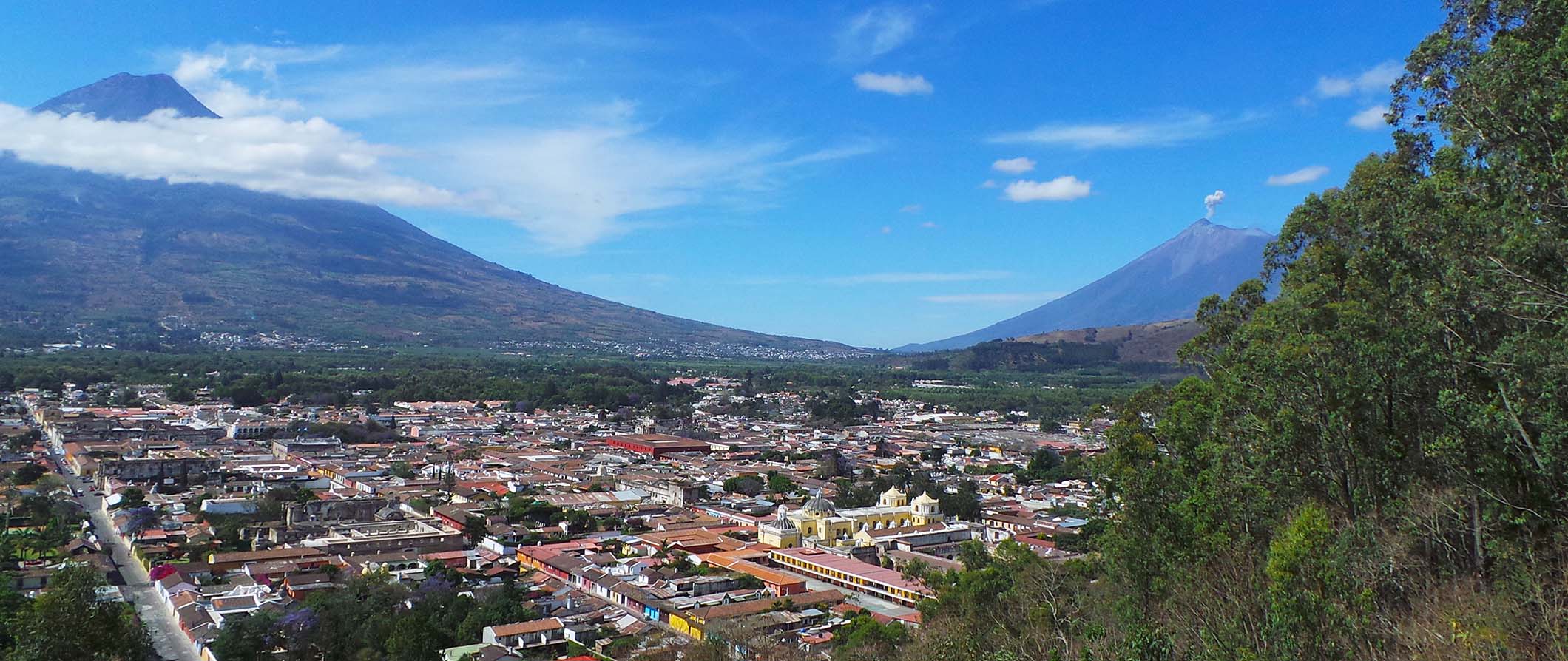
Guatemala is the Mayan heart of Central America . Home to ancient historical sites and incredible ruins, dense jungles, colorful architecture, lively markets, and towering volcanoes, Guatemala is a diverse and beautiful country ripe for budget travel.
The rugged mountains and jungles offer adventurous travelers a chance to get off the beaten path and explore pristine landscapes for a fraction of what you’d pay elsewhere in the world. And the ruins are underrated and a must-see for history buffs, including the impressive Tikal, an ancient Mayan city and a UNESCO World Heritage Site.
I love this country and have always had an incredible time here. (One of my favorite memories involves camping in Tikal National Park)
In this travel guide to Guatemala, I’ll show you how to make the most of your trip, save money, and stay safe in one of Central America’s most popular destinations!
Table of Contents
- Things to See and Do
- How to Stay Safe
- Where to Stay
- Typical Costs
- Suggested Budget
- Money-Saving Tips
- How to Get Around
- Best Places to Book Your Trip
Click Here for City Guides
Top 5 things to see and do in guatemala.
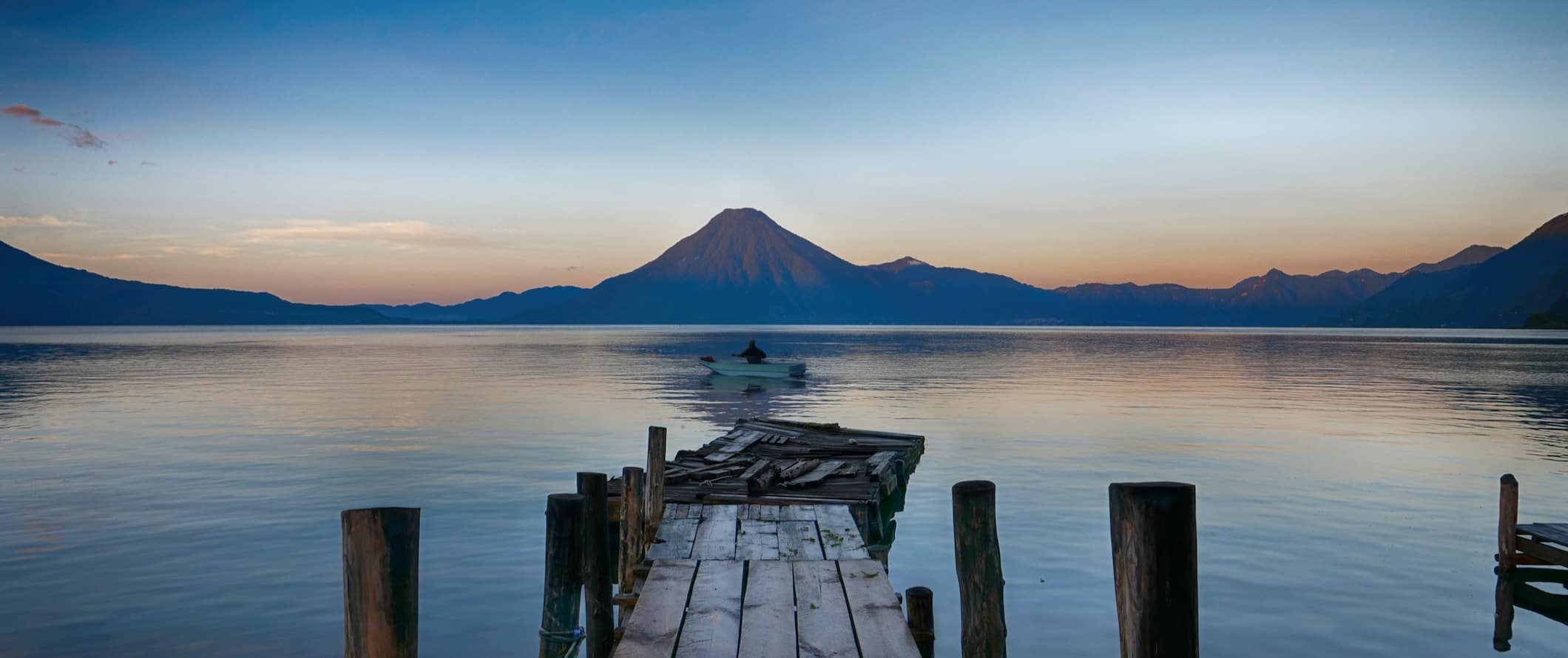
1. Visit Lake Atitlán
This spectacular lake is actually a massive volcanic crater. The lake sits 1,500 meters (4,921 feet) above sea level and is also one of the deepest lakes in Central America. It should come as no surprise that it’s one of the best spots to watch the sunset in Guatemala. On the northern coast of the lake lies the tourist village of Panajachel, a good base to arrange lake and volcano tours (there are two volcanoes here you can explore, Toliman and San Pedro). The village offers incredible views of the surrounding volcanoes and you can also enjoy restaurants, bars, and nightlife in a rustic lakeside setting here too. Boat tours are available as well.
2. Head to Antigua
Antigua is a picturesque colonial city in a highland valley between three volcanoes. It’s full of colonial Spanish architecture, including cobbled streets, what’s left of the centuries-old San Francisco church, houses, and ruins. There’s a vibrant market with colorful Guatemalan blankets and fabrics as well as lots of crafts and souvenirs. Head to the Plaza Mayor to take in the city’s amazing garden and don’t miss a hike up the Fuego volcano (which is active). There are two routes to choose from: La Soledad and the super high, extremely steep Alotenango Route. Conversely, you can hike the difficult (yet super popular) Acatenango volcano, which offers well-earned views of Fuego spitting lava, fire, and ash into the air. The best time for these hikes is during the dry season from the end of November to early April.
3. Explore Tikal National Park
Tikal is home to the most popular Mayan ruins in the country . Located in Petén Province in the north of Guatemala, this enormous national park is a UNESCO World Heritage Site and spans nearly 600 square meters (6,500 square feet), housing centuries of Mayan history and archeology covered in lush vegetation. It is famous for rare animals like pumas, toucans, snakes, monkeys, and many species of birds. Arrive early and stay late as the park empties out in the afternoon when tour groups leave. I also recommend sleeping over in the park to catch the sunrise. You will need to pay extra for a guided tour if you want to see the sunrise or sunset. Ticket prices vary depending on if you buy day tickets, sunrise tickets, or sunset tickets. Admission is 150 GTQ for day hiking before sunset. You can reach Tikal from Flores by shuttle bus or even from neighboring Belize .
4.Visit Semuc Champey
This natural attraction outside the town of Lanquin near Coban consists of 300 meters (984 feet) of limestone bridges over the Cahabòn River that form natural lagoon-like pools. Take a candlelit tour through the Kamba caves, go tubing down the Cahabòn, or swim in the turquoise pools along the bridge. Keep in mind that the caves can only be visited with a guide. It’s possible to get here with local transport, private shuttles, or on a day trip. Go early in the morning to beat the crowds. To avoid getting rained on or risk that the area is flooded, visit during the dry season (December-April). Day trips cost 250-300 GTQ.
5. Explore the Chichicastenango Market
Most people who come to Guatemala visit Chichicastenango, the largest indigenous market in North America. Every Thursday and Sunday, thousands of Quiché Mayans come to town to buy and sell handicrafts, flowers, poetry, trinkets, pottery, and colorful textiles. There are plenty of places to eat tasty street food and buy local fruits and veggies, try fresh juices or Guatemalan coffee, and buy delicious handmade tortillas. Don’t forget to bring smaller bills and remember to bargain for the things you buy. Go early in the morning to beat the crowds.
Other Things to See and Do in Guatemala
1. visit the national museum of archaeology and ethnology.
Located in Guatemala City, this museum houses the many artifacts uncovered from the Mayan archaeological sites around the country. Created in 1898, the museum holds over 20,000 items and artifacts and is a good place to visit so you can learn more about the Mayan culture. Admission is 60 GTQ.
2. See the Yaxha ruins
If Tikal is too touristy for you, consider the more secluded Yaxha ruins. Like Tikal, Yaxha is a massive Mesoamerican archaeological site. Located in the northeast, it was the third-largest Mayan city in the region. Home to several huge stone pyramids, the site was “discovered” in 1904 and dates to 250-600 CE. Spend a few hours looking at ancient drawings and intricately carved hieroglyphs. Admission is 80 GTQ.
3. Explore Quirigua
The archaeological site of Quirigua, located in the southeastern corner of the country near the border with Honduras, contains the largest stelae (upright stone columns covered in drawings or carved into shapes) ever discovered in the Mayan world. Nine stelae are arranged around a central plaza, accompanied by altars carved into zoomorphic shapes that date from the 2nd-8th centuries CE. Although the stelae are unrestored, they are a magnificent sight; the largest of these is a whopping 25 feet tall! Admission is 80 GTQ.
4. Hike the Volcán de Pacaya
This active volcano frequently erupts ash clouds over Antigua, however, it makes for a fun day hike (don’t worry, it’s safe). The trail is relatively easy (it’s not that steep) and takes around two hours to hike, giving you lots of time to admire the view before you actually get a chance to peer into the volcano’s cone. Pacaya can only be accessed with an authorized guide so you will need to book a tour. Be aware the cheap tours often just offer transportation and a Spanish-speaking guide. If you don’t speak Spanish you will need to ask for an English-speaking guide. Guided hikes start at 250 GTQ . Some of the tours also include a visit to a thermal spa where you can soak in the naturally warm waters as well as a chance to roast marshmallows over the volcano.
5. Wander Flores
A small island, Flores sits on Lake Peten Itza, a large lake in the north and the second-largest lake in the country. A narrow man-made causeway connects the island to the mainland and the region is perfect for hiking, swimming, and spotting wildlife. From here, you’re just a short drive away from some of the most untamed jungles in the country (it makes for a good base for exploring the nearby jungles). It’s also close to the ruins at Tikal.
6. Visit the ruins at El Mirador
El Mirador is one of the most undiscovered Mayan sites in Guatemala. Located near the border with Mexico in the northeast, the majority of its complexes lie in the depths of the jungle and remain relatively inaccessible to tourists. It’s the largest of all the Mayan ruins, rivaling even the pyramids in Egypt in size. Though discovered in 1926, researchers didn’t start studying it until 2003! Multi-day tours cost around 2,300-3,100 GTQ since it’s so remote.
7. Explore Rio Dulce
Rio Dulce is a gorgeous river and popular backpacker destination in eastern Guatemala. Two towns, El Relleno and Fronteras, lie on either side of the river and are connected by one of the largest bridges in Central America. The area is famous for its trekking and water activities, including the Finca Paraiso hike, which leads to a hot spring and a waterfall. The Quiriguá ruins (mentioned above) are also nearby and worth a visit.
8. Visit the Antigua Market
This sprawling market is colorful and somewhat chaotic. It’s open-air and filled with everything from fruits and vegetables to handmade crafts and poultry to fake DVDs and knock-off jeans. Come here to buy souvenirs, people watch, and take in the bustling chaos!
9. Relax at Monterrico
This is the most popular beach in the country. Located close to Guatemala City and Antigua, this laid-back beach town is a relaxing place to catch some sun and hit the waves. Between June-December, you can also see giant leatherback, green sea, and smaller olive ridley turtles. There are also lots of tours of the nearby mangroves.
10. Hike Acatenango
Located near Antigua, Acatenango is a stratovolcano standing almost 4,000 meters (13,000 feet). It’s the third-highest volcano in Central America and last erupted in 1972. It offers a strenuous 7-8-hour hike up to a campsite, where you camp overnight before summiting to watch the sunrise. Overnight hiking tours cost around 600-800 GTQ and include cold-weather gear, an English-speaking guide, and park admission.
11. Watch the sunrise from Indian Nose
The sunrise from the Indian Nose volcano is quite possibly one of the most magical sunrises you will ever experience. Located next to Lake Atitlan, you’ll get to look out across the water and the magnificent volcanoes before you (including the Atitlán and San Pedro volcanoes). You can do this hike alone but it is difficult finding the path in the dark so it is much better to go with a guide. Expect to pay around 465 GTQ.
12. Learn to surf
Guatemala isn’t known for its beaches but the small coastal town of El Paredon is a well-kept secret where you can hit the waves. The black sand beach is beautiful and the surf is great. A board rental is around 100-125 GTQ per day and surf lessons cost around 120 GTQ for a private class, including a board.
How to Stay Safe in Guatemala
While Guatemala is generally safe, there’s no denying that certain precautions should be taken as there is a lot of petty crime (and other safety issues) in the country. Avoid isolated areas, especially at night and in big cities. Keep your personal belongings on you while using public transit (especially chicken buses) and night buses.
Additionally, don’t wear flashy jewelry or leave your valuables out in the open. Petty theft is common here so you must be vigilant.
Violent attacks against tourists are rare. Most of the time it’s because the tourist was involved in something drug-related or was where they shouldn’t be at night.
Scams are common in the larger cities so be wary of any overly friendly strangers. You can read about common travel scams to avoid right here.
Solo female travelers should generally feel safe here, however, the standard precautions apply (never leave your drink unattended at the bar, never walk home alone intoxicated, etc.). Whenever possible, share a taxi with friends and avoid walking around alone just to be safe.
Guatemala is home to 37 volcanoes so volcanic activity isn’t uncommon. Be sure to check for warnings before you embark on any hikes/activities (especially ones on or around volcanoes).
Additionally, due to its political instability, protests and demonstrations are common. If one is occurring near you, simply head back to your accommodation and avoid taking part.
If you experience an emergency, dial 110 for assistance.
The most important piece of advice I can offer is to purchase good travel insurance. Travel insurance will protect you against illness, injury, theft, and cancellations. It’s comprehensive protection in case anything goes wrong. I never go on a trip without it as I’ve had to use it many times in the past. You can use the widget below to find the policy right for you:
Where to Stay in Guatemala
Guatemala has plenty of hostels in all the major cities. Here are some of my suggested places to stay:
- Hostal Guatefriends (Guatemala City)
- Maya Papaya (Antigua)
- Barbara’s Boutique Hostel (Antigua)
- La Iguana Perdida (Santa Cruz, Lake Atitlan)
- Casa de Grethel (Flores)
- Hostal Los Lagos (Guatemala City)
Guatemala Travel Costs
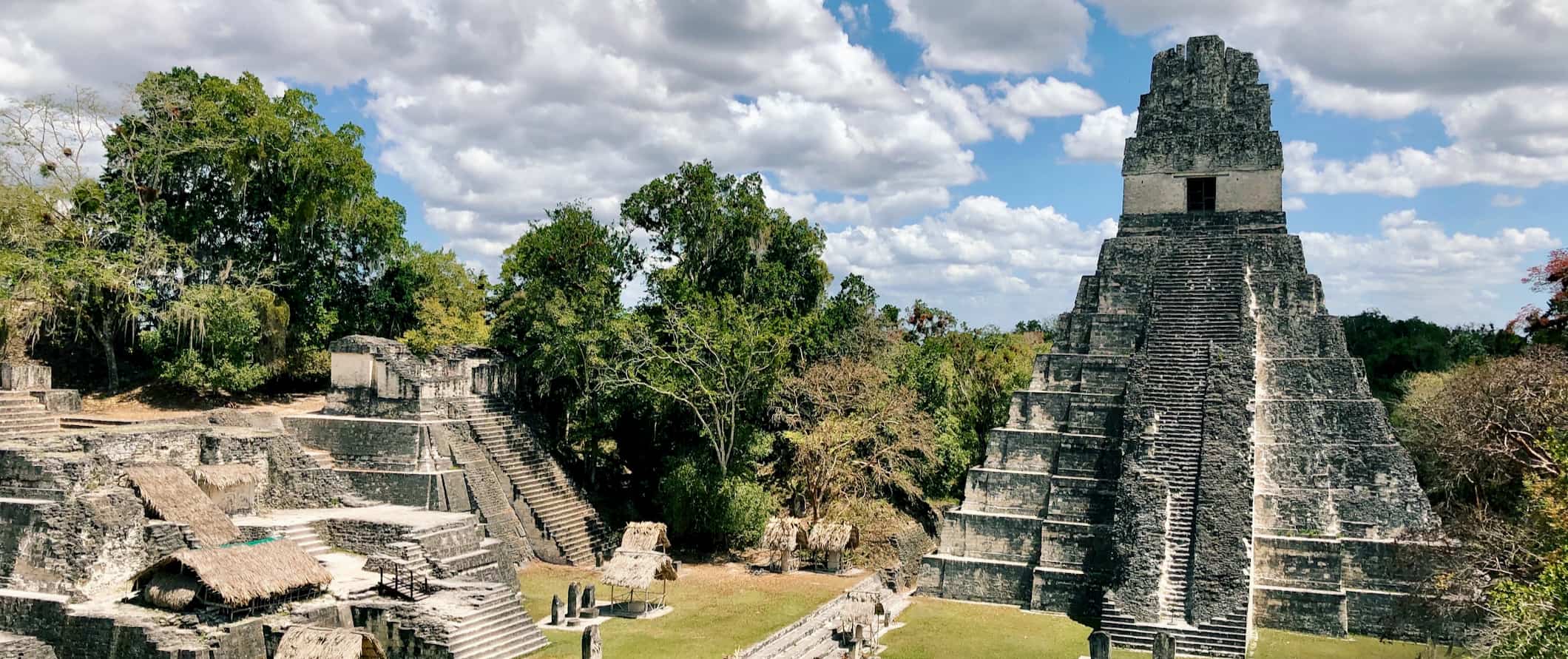
Accommodation
- Hostel dorms – 60 GTQ per night
- Hostel private rooms – 140-300 GTQ per night
- Budget hotels – 235-500 GTQ per night
- Airbnb private rooms – 200 GTQ per night
- Airbnb apartments – 300-800 GTQ per night
- Street food – 15-30 GTQ
- Traditional restaurants – 40 GTQ
- Mid-range restaurants – 250 GTQ
- Western restaurants – 100 GTQ
- Fast food (think McDonald’s) – 45 GTQ
- Beer – 15 GTQ
- Cappuccino/latte – 19 GTQ
- Bottled water – 6 GTQ
- Groceries for a week – 200 GTQ
Guatemala Suggested Budgets
Backpacker – 250 gtq per day.
As a backpacker in Guatemala, this budget covers staying in a hostel dorm, cooking most of your meals, sticking to free activities (like hiking and the beach), limiting your drinking, and using public transportation to get around.
Midrange – 650 GTQ Per Day
On a midrange budget, you can stay in an Airbnb, eat out for all your meals, enjoy a few drinks, take some guided tours, use taxis here and there, and visit more attractions such as museums or ruins.
Upscale – 1,750 GTQ Per Day
On a “luxury” budget, you can stay in a hotel, take taxis everywhere, book higher-end tours (including private tours and day tours), and eat out every meal at nicer restaurants. The sky is the limit!
Guatemala Travel Guide: Money-Saving Tips
It’s easy to save money while traveling in Guatemala since the country isn’t that expensive. However, a good budget traveler always looks for ways to maximize value. Here are some of the best ways to save money in Guatemala:
Bring a reusable water bottle – The tap water here isn’t safe to drink so bring a reusable water bottle with a filter. LifeStraw has a built-in filter so you can ensure your water is always clean and safe to drink.
Take a free walking tour – In some of the larger cities (like Antigua) you can find free walking tours. They’re the best way to get introduced to a new destination. Freetour.com has options you can choose from. Just be sure to tip your guide at the end!
Stay with a local – While accommodation is cheap here, staying with a local via Couchsurfing makes it free. Not only will you save some money, but you’ll get firsthand knowledge from a local!
Visit the Mercado – Although eating out is cheap in Guatemala, it makes sense to shop at the markets for your food to take on day trips or to prepare at your hostel. Fruit costs mere pennies and everything is always fresh.
Eat street food – The local street food is the cheapest food you can eat — and the tastiest. Stick to street food when it comes to eating out.
Avoid flying – Bus rides are longer, but if you are trying to see the country on a budget you shouldn’t fly. An hour-long flight can cost hundreds of dollars. Avoid flying as much as possible!
Avoid drinking – Sure, the beer here is cheap but a couple of beers every day will add up. Watch your drinking to keep your budget intact!
How to Get Around in Guatemala
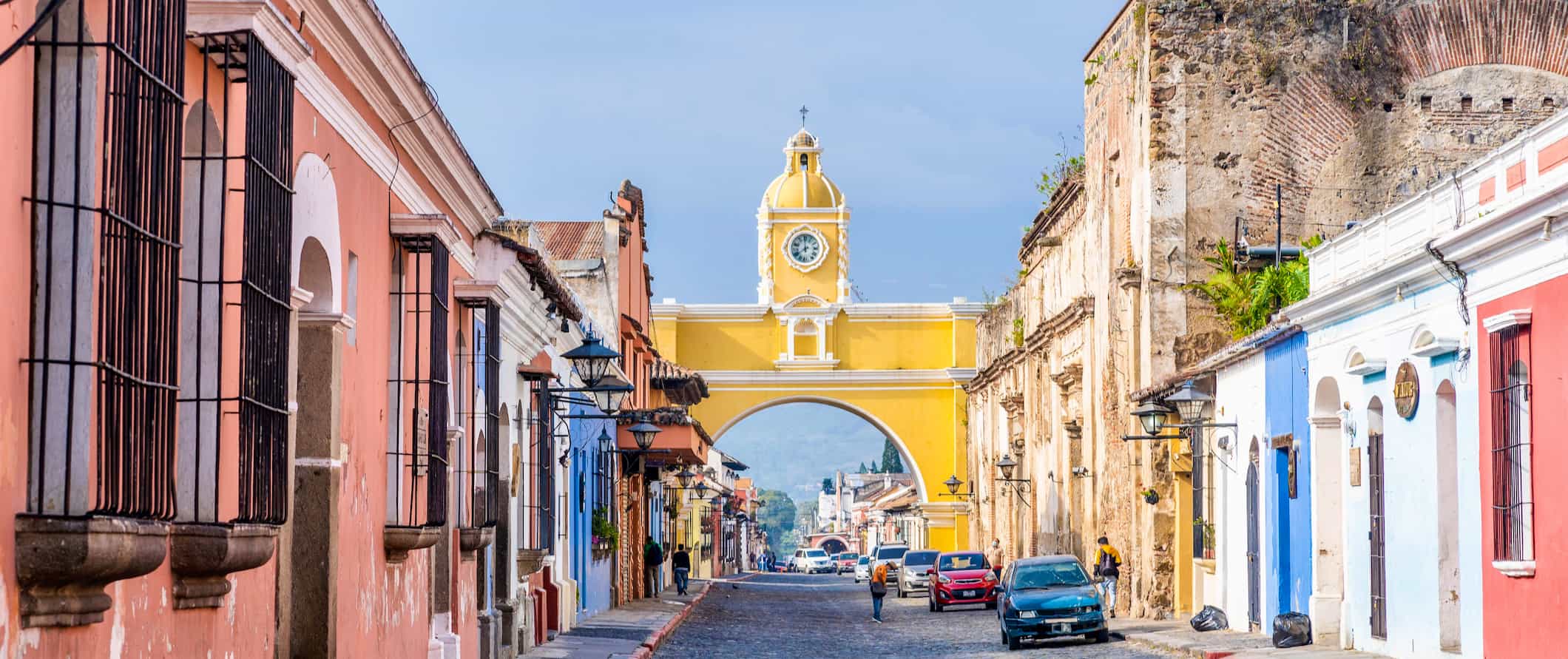
Public transportation – The main method of transportation in Guatemala is las camionetas (“chicken buses”). They are old school buses from North America and are the most inexpensive way to get around. Expect to pay around 10 GTQ for a 1-2 hour journey. Shorter journeys can cost as little as 5 GTQ.
If you are traveling between places like Antigua and Lake Atitlan, shuttle buses are the most common form of transport for backpackers. Travel between Antigua and Guatemala City costs around 150 GTQ on a shuttle bus. On a chicken bus, it costs considerably less.
Train – There are no trains in Guatemala.
Bus – Because of the poor condition of the roads in Guatemala large coach buses aren’t available on many routes. You can find night buses between Guatemala City and Flores to take you to countries like Mexico , Belize , and Nicaragua . For most other places, you have to rely on shuttle buses.
You have two options for booking: asking in your hostel to call and book for you and pay in cash, or booking online through guatego.com. Unfortunately, websites like Busbud don’t operate in Guatemala as their transport infrastructure is still developing.
Keep in mind the shuttles are pretty basic. Most don’t have working AC and are not very spacious. Plan for delays as well.
Flying – There are regular flights from Guatemala City to Flores, usually costing around 1,000-1,400 GTQ per person for the one-hour flight. If you are short on time and have plenty of money to spend, I suggest flying. But for most travelers, the bus is the best option.
Car rental – Renting a car costs around 175 GTQ per day. Do take care if you decide to drive in Guatemala as the roads aren’t the best and landslides are common during the rainy season (which can often result in both accidents and road closures). Make sure you have an International Driving Permit (IDP) — you’ll need one for any car rental.
For the best car rental prices, use Discover Cars .
Hitchhiking – Hitchhiking is not common in Guatemala and not recommended for safety reasons. For more information, visit HitchWiki .
When to Go to Guatemala
Guatemala is a fantastic place to visit at any time of the year because of its spring-like climate. As many places are at altitude, you can expect cool mornings and evenings and warm days. Expect temperatures to sit between 18-28°C (65-82°F).
Many choose to avoid Guatemala during the rainy season (May-September) as the rain can be a bit disruptive, especially if you want to do things like hiking. That said, it is during these months that Guatemala is at its most beautiful as the country turns green and the flowers bloom. Prices also drop significantly during the rainy season.
To beat the crowds, visit in the shoulder season (the start or end of the rainy season). You’ll see fewer people and things will be a little cheaper. The weather won’t be perfect but it will still be sunny and warm most days so you’ll still be able to hike.
Guatemala Travel Guide: The Best Booking Resources
These are my favorite companies to use when I travel. They consistently have the best deals, offer world-class customer service and great value, and overall, are better than their competitors. They are the companies I use the most and are always the starting point in my search for travel deals.
- Skyscanner – Skyscanner is my favorite flight search engine. They search small websites and budget airlines that larger search sites tend to miss. They are hands down the number one place to start.
- Hostelworld – This is the best hostel accommodation site out there with the largest inventory, best search interface, and widest availability.
- Booking.com – The best all around booking site that constantly provides the cheapest and lowest rates. They have the widest selection of budget accommodation. In all my tests, they’ve always had the cheapest rates out of all the booking websites.
- Get Your Guide – Get Your Guide is a huge online marketplace for tours and excursions. They have tons of tour options available in cities all around the world, including everything from cooking classes, walking tours, street art lessons, and more!
- SafetyWing – Safety Wing offers convenient and affordable plans tailored to digital nomads and long-term travelers. They have cheap monthly plans, great customer service, and an easy-to-use claims process that makes it perfect for those on the road.
- LifeStraw – My go-to company for reusable water bottles with built-in filters so you can ensure your drinking water is always clean and safe.
- Unbound Merino – They make lightweight, durable, easy-to-clean travel clothing.
- Top Travel Credit Cards – Points are the best way to cut down travel expenses. Here’s my favorite point earning credit cards so you can get free travel!
GET YOUR FREE TRAVEL STARTER KIT
Enter your email and get planning cheatsheets including a step by step checklist, packing list, tips cheat sheet, and more so you can plan like a pro!

- Where To Stay
- Transportation
- Booking Resources
- Related Blogs
- Travel Advisories |
- Contact Us |
- MyTravelGov |
Find U.S. Embassies & Consulates
Travel.state.gov, congressional liaison, special issuance agency, u.s. passports, international travel, intercountry adoption, international parental child abduction, records and authentications, popular links, travel advisories, mytravelgov, stay connected, legal resources, legal information, info for u.s. law enforcement, replace or certify documents.
Before You Go
Learn About Your Destination
While Abroad
Emergencies
Share this page:
Travel Advisory July 17, 2023
Guatemala - level 3: reconsider travel.
Reissued with obsolete COVID-19 page links removed.
Reconsider travel to Guatemala due to crime . Some areas have increased risk. Read the entire Travel Advisory.
Do not travel to:
- San Marcos Department (except the city of San Marcos) due to crime .
- Huehuetenango Department (except the city of Huehuetenango) due to crime .
- Zone 18 and the city of Villa Nueva in Guatemala City due to crime .
Country Summary: Violent crime such as extortion, murder, armed robbery, carjacking, narcotics trafficking and gang activity are common in Guatemala. Local police may lack the resources to respond effectively to criminal incidents resulting in a low arrest and conviction rate. Guatemala’s National Tourist Assistance Program ( PROATUR ) provides 24-hour emergency assistance and routine guidance to tourists. PROATUR also provide additional security in locations frequented by tourists. The call center is staffed with Spanish and English speakers and can be reached 24/7 by calling 1500 or +502-2290-2800.
U.S. government personnel and family members are prohibited from traveling to/throughout the above-mentioned areas for personal travel but are permitted to travel throughout the rest of Guatemala, including tourist destinations such as Tikal, Antigua, Lake Atitlán, and Pacific coast areas in the Santa Rosa and Escuintla Departments.
Read the country information page for additional information on travel to Guatemala.
If you decide to travel to Guatemala:
- When traveling to Lake Atitlán, use certified tourist providers and travel between villages on the lakeshore by chartered boat, as perimeter paths pose a serious crime risk and are not easily accessible by emergency services. Hiking in the area, while popular, is best undertaken with the assistance of a local guide to ensure safety, as criminals are known to target some routes.
- When visiting Pacific coast beaches and resorts in the Santa Rosa and Escuintla Departments, arrange travel through hotel, resort, or charter agents. We recommend traveling to and from hotels, resorts, and fishing charters via road from Guatemala City during daylight hours only.
- Visitors are strongly advised to avoid swimming in the Pacific Ocean, since currents and undertows are strong, and beaches lack adequate lifeguards or emergency response.
- Visitors should not leave drinks unattended in bars and restaurants and are advised to decline invitations from strangers to private parties or gatherings.
- Consider staying in hotels or other lodging facilities that offer secure parking, doormen, and a dedicated and professional security staff.
- Request security escorts, which are available for tourist groups, from the Guatemalan Tourism Institute ( INGUAT ).
- Be aware of your surroundings and avoid walking or driving at night.
- Do take radio-dispatched taxis (Taxi Amarillo), INGUAT-approved taxis from the “SAFE” stand at the airport, hotel taxis, vetted private drivers, and/or Uber.
- Do not take public transportation, including white car taxis. U.S. government personnel and their family members are prohibited from using these forms of transportation.
- Do not attempt to hike walking trails or volcanoes without the services of a qualified local guide. Robberies are commonplace, and emergency response is lacking.
- Do not physically resist any robbery attempt.
- Do not use public ATMs.
- Do not display signs of wealth, such as wearing expensive watches or jewelry, and avoid using mobile devices in public.
- Enroll in the Smart Traveler Enrollment Program (STEP) to receive Alerts while in Guatemala and make it easier to locate you in an emergency.
- Follow the Department of State on Facebook and Twitter .
- Review the Country Security Report for Guatemala.
- Prepare a contingency plan for emergency situations. Review the Traveler’s Checklist .
- Visit the CDC page for the latest Travel Health Information related to your travel.
San Marcos Department – Level 4: Do Not Travel
All U.S. government personnel and family members are prohibited from traveling to San Marcos Department for personal travel, except for the city of San Marcos. Narcotics trafficking is widespread, and large portions of the department are under the influence of drug trafficking organizations. Several municipalities lack police presence, and local police may lack the resources to respond effectively to serious criminal incidents. Avoid areas outside of major roads and highways. Visit our website for Travel to High-Risk Areas .
Huehuetenango Department – Level 4: Do Not Travel
All U.S. government personnel and family members are prohibited from traveling to Huehuetenango Department for personal travel, except for the city of Huehuetenango. Narcotics trafficking is widespread, and large portions of the department are under the influence of drug trafficking organizations. Several municipalities lack police presence, and local police may lack the resources to respond effectively to serious criminal incidents. Avoid areas outside of major roads and highways.
Visit our website for Travel to High-Risk Areas .
Zone 18 and Villa Nueva within the Guatemala Department – Level 4: Do Not Travel
U.S. government personnel and family members are free to travel within Guatemala City except for zone 18 and the municipality of Villa Nueva. The following zones in Guatemala City are of elevated concern due to crime: 5, 6, 7, 12, 13, 17, 19, 21, and 24. U.S. citizens should take appropriate security measures when traveling to and from the airport such as only using vetted transportation services, not displaying valuables or other signs of wealth, refraining from using mobile devices in public, and not lingering outside the airport. U.S. citizens are advised not to hail white-car taxis on the street in Guatemala City. Use radio-dispatched taxis (Taxi Amarillo), INGUAT-approved taxis from the “SAFE” stand at the airport, hotel taxis, vetted private drivers, or Uber.
Embassy Messages
View Alerts and Messages Archive
Quick Facts
Passport must be valid at the time of entry.
One page per stamp.
A visa is not required.
There are no restrictions, but if the passenger is carrying $10,000 or more, s/he will need to justify the income and the purpose
Embassies and Consulates
U.S. Embassy Guatemala City
Boulevard Austriaco 11-51, Zone 16 Guatemala City, Guatemala Telephone: +(502) 2354-0000 Emergency After-Hours Telephone: +(502) 2354-0000 [email protected]
Destination Description
Learn about the U.S. relationship to countries around the world.
Entry, Exit and Visa Requirements
To enter Guatemala, you will need a U.S. passport that is valid at the time of entry. There is no minimum validity period for a U.S. passport. U.S. citizens do not need a visa and are admitted to Guatemala for 90 days. Some airlines require that passengers complete the electronic Guatemalan immigration form prior to check-in Although you may select to fill out the form in English, in drop down menus, United States is listed as “Estados Unidos.”
If your passport is lost or stolen while you are in Guatemala, please obtain a new passport at the U.S. Embassy as soon as possible. In order to be permitted to depart Guatemala, you will present the new passport together with a police or Ministerio Publico report regarding the loss/theft to the Guatemalan Immigration Agency ( Dirección de Migración ).
Visit the Ministry of Foreign Affairs website (Spanish only) or contact the Guatemalan Embassy for the most current visa information. If a U.S. citizen exceeds the period of authorized stay, a fine of 15 Guatemalan quetzals (GTQ) per day is imposed, and this fine must be paid to be permitted to depart Guatemala.
The U.S. Department of State is unaware of any HIV/AIDS entry restrictions for visitors to or foreign residents of Guatemala.
Find information on dual nationality , prevention of international child abduction , and customs regulations on our websites.
Safety and Security
Guatemala has a dedicated tourism assistance program (called PROATUR ) whose sole mission is to assist and protect foreign tourists in Guatemala. Their emergency assistance call center – staffed with Spanish and English speakers – may be contacted 24/7 by calling 1500 or +502-2290-2810. You may also contact PROATUR by WhatsApp at +502-5188-1819.
Crime: Theft, armed robbery, and carjacking are the most common crimes against U.S. citizens.
Travelers have experienced carjackings and armed robberies upon leaving the airport. Victims have been violently assaulted when they resisted an attack or refused to give up money or valuables. Pickpockets and purse-snatchers are prevalent in major cities and tourist sites, especially the central market and other parts of Zone 1 in Guatemala City. In a common scenario, an accomplice distracts the victim while an assailant slashes a bag or backpack or simply steals it.
Reports of sexual assault remain high. Support for victims of sexual assault is lacking.
The Guatemalan border with Mexico, in particular the northwestern corner of Petén, is a high-risk area due to large scale drug and alien smuggling. There have been instances of narco-related homicides in this area, especially along CA-13. Visitors are encouraged to fly to nearby Flores when visiting Tikal. Travelers should remain in groups, stay on principal trails leading to the Central Plaza and the Temple IV complex, and avoid remote areas of the park.
Due to heightened risk of crime, U.S. Embassy personnel are not permitted to go to Zone 18 in Guatemala City, Huehuetenango Department (except the city of Huehuetenango), and San Marcos Department (except the city of San Marcos). For more detailed information, please see the Guatemala Travel Advisory .
To decrease the likelihood of becoming a victim:
- Be aware of your surroundings. Report any crime incidents promptly to the police.
- Carry a photocopy of your passport in case you lose your passport.
- Do not use public ATMs. Only use ATMs inside secure bank lobbies or hotels. Scams involving attempts to acquire a victim’s ATM card and personal identification number (PIN) are common. U.S. citizens have been victims of credit card scams where the card is copied and used improperly.
- Do not display signs of wealth, such as wearing expensive jewelry or watches. Refrain from using a cell phone on the street. A common crime against foreign citizens in Guatemala is robbery of cell phones.
- Do not use local public buses . U.S. Embassy personnel are not permitted to use any local buses. Avoid low-priced public inter-city buses (often recognizable as recycled and repainted U.S. school buses). Travelers also have been attacked on first-class buses on highway CA-2 near the border areas with both Mexico and El Salvador, on highways CA-1 and CA-9 near the border with El Salvador, and in the highlands between Quetzaltenango and Sololá. Public buses are subject to frequent attacks by armed robbers, and often are poorly maintained and dangerously driven.
- Do not hail taxis on the street in Guatemala City, instead use radio-dispatched taxis (Taxi Amarillo), INGUAT-approved taxis from the “SAFE” stand at the Guatemala City airport, or hotel taxis. Uber is also considered safe to use in Guatemala City and Antigua.
Tourist groups are advised to request security escorts. Security escorts for tourist groups are available from INGUAT and may be requested by calling 1500 or +502-2290-2800.
- Requests should be directed to the attention of the Coordinator of the National Tourist Assistance Program , and should provide the itinerary, names of travelers, and model and color of the vehicle in which they will be traveling.
- The request should be submitted by mail, fax, or e-mail , and should arrive at INGUAT at least three business days in advance of the proposed travel.
- INGUAT may not be able to accommodate all requests.
- Visit INGUAT’s web site .
Demonstrations occur frequently. They may take place in response to political or economic issues, on politically significant holidays, and during international events.
- Demonstrations can be unpredictable. Avoid areas around protests and demonstrations
- Past demonstrations have turned violent.
- Check local media for updates and traffic advisories.
International Financial Scams: See the Department of State and the FBI pages for information.
Internet romance and financial scams are prevalent in Guatemala. Scams are often initiated through Internet postings/profiles or by unsolicited emails and letters. Scammers almost always pose as U.S. citizens who have no one else to turn to for help. Common scams include:
- Romance/Online dating
- Money transfers
- Lucrative sales
- Contracts with promises of large commissions
- Grandparent/Relative targeting
- Free Trip/Luggage
- Inheritance notices
- Work permits/job offers
- Bank overpayments
Victims of Crime: U.S. citizen victims of sexual assault are encouraged to contact the U.S. Embassy for assistance. Report crimes to the police through the tourist assistance program ( PROATUR ) at 1500 or +502-2290-2800 and contact the U.S. Embassy at+502-2354-0000. Remember that local authorities are responsible for investigating and prosecuting crime.
See our webpage on help for U.S. victims of crime overseas .
The U.S. Embassy can:
- help you find appropriate medical care.
- assist you in reporting a crime to the police.
- contact relatives or friends with your written consent.
- provide general information regarding the victim’s role during the local investigation and following its conclusion.
- provide a list of local attorneys
- provide our information on victim’s compensation programs in the United States.
- provide an emergency loan for repatriation to the United States and/or limited medical support in cases of destitution.
- help you find accommodations and arrange flights home.
- replace a stolen or lost passport.
Domestic Violence: U.S. citizen victims of domestic violence may contact the U.S. Embassy for assistance.
Tourism: The tourism industry is unevenly regulated, and safety inspections for equipment and facilities do not commonly occur. Hazardous areas/activities are not always identified with appropriate signage, and staff may not be trained or certified either by the host government or by recognized authorities in the field. In the event of an injury, appropriate basic medical treatment is typically available only in/near major cities. First responders may encounter obstacles to accessing areas outside of major cities, and/or be unable to provide urgent medical treatment. U.S. citizens are encouraged to purchase medical evacuation insurance. See our webpage for more information on insurance providers for overseas coverage .
Water Safety: Basic safety measures and precautions for swimming, boating, and other outdoor activities may not be observed in Guatemala.
- Beware of strong currents, riptides, and undertows along Guatemala's Pacific coast beaches, as well as at Lake Atitlan. Lifeguards are rarely present.
- Signs that warn of treacherous surf are rare and confined mostly to private beaches owned by hotels.
Potential for Natural Disasters:
- There are four active volcanoes in Guatemala: Fuego, Pacaya, Tacaná, and Santiaguito. Volcanic activity has forced evacuations of nearby villages. U.S. Embassy personnel are not permitted to visit the Agua volcano due to the high incidence of robberies on the volcano.
- Be aware of the possibility of earthquakes at any time and make contingency plans. Consult Guatemala’s National Seismic Institute ( INSIVUMEH ) for updates on earthquakes and seismic activity.
- Both the Caribbean and Pacific coasts of Guatemala are vulnerable to hurricanes and tropical storms from mid-May through November.
- Mudslides and flooding during the May to November rainy season often kill dozens of people and close roads.
- Consult Guatemala’s National Disaster Reduction Coordination Office (CONRED) for updates on natural disasters or tropical storms and hurricanes.
Indigenous Areas: Be mindful of local traditional practices when visiting indigenous Maya communities as tensions can rise quickly and locals occasionally take the law into their own hands.
- Particularly in small villages, residents are often wary and suspicious of outsiders.
- Avoid activities that might unintentionally violate a cultural or religious belief.
- In the past, Guatemalan citizens have been lynched for suspicion of child abduction. Maintain distance from local children and refrain from actions that could fuel such suspicions.
Local Laws & Special Circumstances
Criminal Penalties: You are subject to local laws. If you violate local laws, even unknowingly, you may be expelled, arrested, or imprisoned. Individuals establishing a business or practicing a profession that requires additional permits or licensing should seek information from the competent local authorities, prior to practicing or operating a business.
Furthermore, some violations of law that occur in Guatemala are also prosecutable in the United States, regardless of local law. For examples, see our websites on crimes against minors abroad and the Department of Justice website.
Arrest Notification: If you are arrested or detained, ask police or prison officials to notify the U.S. Embassy immediately. See our webpage for further information.
Counterfeit and Pirated Goods: Although counterfeit and pirated goods are prevalent in many countries, they may still be illegal according to local laws. You may also pay fines or have to give them up if you bring them back to the United States. See the U.S. Department of Justice website for more information.
Faith-Based Travelers: See the following webpages for details:
- Faith-Based Travel Information
- International Religious Freedom Report – see country reports
- Human Rights Report – see country reports
- Hajj Fact Sheet for Travelers
- Best Practices for Volunteering Abroad
LGBTI Travelers: There are no legal restrictions on same-sex sexual relations or the organization of LGBTQI+ events in Guatemala. While there is no legal recognition of same-sex partnerships or marriages, private same-sex sexual activity between consenting adults is legal.
- Antidiscrimination laws exist, but do not include specific protections based on sexual orientation or gender identity.
- There is general societal discrimination against LGBTI persons in relation to their access to education, health care, employment, and housing.
- According to LGBTI rights groups, gay and transgender individuals often experience police abuse. LGBTI rights groups allege that police officers regularly engage in extortion by waiting outside clubs and bars frequented by LGBTI persons to demand protection money or payment to avoid jail.
- A lack of trust in the judicial system and a fear of further harassment or social recrimination discourages victims from filing complaints.
See our LGBTI Travel Information page and section 6 of our Human Rights report for further details.
Travelers with Disabilities: The law in Guatemala prohibits discrimination against persons with physical, , intellectual or mental disabilities, and the law is enforced. Social acceptance of persons with disabilities in public is not as prevalent as in the United States. The most common types of accessibility may include accessible facilities, information, and communication. Expect accessibility to be limited in public transportation, information, and general infrastructure, and common in lodging and communication. There is a significant difference between Guatemala City and the rest of the country.
Students: See our Students Abroad page and FBI travel tips .
Women Travelers: See our travel tips for Women Travelers .
Customs: Guatemalan customs authorities may enforce strict regulations concerning temporary importation into or export from Guatemala of items such as antiquities and other cultural property.
When traveling to Guatemala for temporary work related to your profession, if you bring in any technical equipment or tools, you must declare this equipment/these tools upon entry. The equipment/tools must be of a personal, not commercial, quantity. You must take the equipment/tools with you when you depart. If, upon entry, you intend to leave any equipment/tools in Guatemala, you are required to report that to customs authorities and pay import taxes.
Contact the Embassy of Guatemala in Washington, D.C . ion. (phone: 202-745-4953) or one of Guatemala’s consulates in the United States for specific information.
The full range of medical care is available in Guatemala City, but medical care outside of the city is limited. Guatemala’s public hospitals frequently experience serious shortages of even the most basic medicines and equipment. Care in private hospitals is generally adequate for most common illnesses and injuries, and many of the medical specialists working in them are U.S.-trained and -certified. The U.S. Embassy maintains a list of medical providers and hospitals on our website. We do not endorse or recommend any specific medical provider or clinic.
Many hospitals in Guatemala require payment prior to treating patients, even if personal insurance will cover the treatment. They do not typically enter into payment plan agreements, and they may decline to discharge you from the hospital if you owe money for treatment.
For emergency services in Guatemala, dial 110.
Ambulance services are not present throughout the country or are unreliable in most areas except urbanized areas.
We do not pay medical bills . Be aware that U.S. Medicare/Medicaid does not apply overseas. Most hospitals and doctors overseas do not accept U.S. health insurance.
Medical Insurance: Make sure your health insurance plan provides coverage overseas. Most care providers overseas only accept cash payments. See our webpage for more information on insurance providers for overseas coverage. Visit the U.S. Centers for Disease Control and Prevention for more information on type of insurance you should consider before you travel overseas.
We strongly recommend supplemental insurance to cover medical evacuation.
Always carry your prescription medication in original packaging, along with your doctor’s prescription. Check with the Guatemalan Public Health Ministry to ensure the medication is legal in Guatemala.
Vaccinations: Be up to date on all vaccinations recommended by the U.S. Centers for Disease Control and Prevention.
Further health information:
- World Health Organization
- U.S. Centers for Disease Control and Prevention (CDC)
Air Quality: Visit AirNow Department of State for information on air quality at U.S. Embassies and Consulates.
Travel and Transportation
Road Conditions and Safety: Road hazards are common. Secondary and rural roads have little to no illumination. U.S. Embassy employees are prohibited from traveling outside the capital city at night. Be vigilant of motorcyclists who weave unexpectedly across lanes of traffic and pedestrians who unexpectedly dart across roads due to the lack of defined crosswalks.
Robberies of occupied vehicles are common in Guatemala City, often by two assailants on motorcycles who pull up alongside a car stopped at a traffic light. There have also been numerous reports of violent criminal activity along Guatemala’s main highways, including the Carretera a El Salvador (Inter-American Highway CA-2).
Armed attacks have occurred in various places in Guatemala, including:
- On roads between Guatemala City and the Petén region;
Between Tikal and the Belize border; and
- On tThe Inter-American Highway (CA-1) and the road from Guatemala City to the Caribbean coast (CA-9), due to heavy traffic, including large trucks and trailers.
U.S. Embassy employees are prohibited from driving from or through Mexico to Guatemala.
Stay on main roads when traveling to and from Antigua and Lake Atitlan. Secondary roads in those areas are poorly maintained and have experienced higher incidents of robbery, rape, and armed assault.
PROVIAL, a roadside assistance force, patrols most of the major highways in the country. PROVIAL can be contacted by calling +502-2422-7800. Travelers may also call the police for roadside assistance by dialing 110 or 120, or the fire department by dialing 122 or 123; however, patrols are sporadic.
Traffic Laws: Valid U.S. driver’s licenses are accepted for the first 30 days of a visit, and international driving permits are accepted for extended stays. Laws and speed limits are often ignored, turn signals are rarely used, and passing on dangerous stretches of highway is common.
It is against the law for drivers to operate cellular phones while driving.
People found driving under the influence of alcohol or other drugs will be arrested and may serve jail time.
All drivers involved in accidents resulting in injury may be detained and held in protective custody pending investigation and/or payment of alleged damages.
Public Transportation: The most common form of public transportation is the system of brightly-painted recycled school buses. Criminal activity and frequent fatal accidents, however, make these low-priced local and inter-city buses particularly dangerous. U.S. Embassy employees are not permitted to use these public buses.
Use of radio-dispatched taxis or Uber is far safer than hailing taxis on the street. In Guatemala City, there are several radio taxi companies in operation:
- Taxi Seguro can be reached at +502-2312-4243.
- Taxi Amarillo Express (yellow taxis) is a radio-dispatch taxi service reached by dialing 1766.
- A Green Cab radio dispatch service operates in the suburbs near zone 15 and the Cayalá entertainment and shopping destination.
- To use Uber, download their app or go to https://www.uber.com .
U.S. Embassy employees are prohibited from using the white taxis. The Guatemalan Tourist Assistance Program, PROATUR , may be able to provide additional information and can be reached by dialing 1500 or +502-2290-2800.
See our Road Safety page for more information. Visit the website of Guatemala’s national tourist office and national authority responsible for road safety, or contact them via e-mail .
Aviation Safety Oversight: The U.S. Federal Aviation Administration (FAA) has assessed the Government of Guatemala’s Civil Aviation Authority as being in compliance with International Civil Aviation Organization (ICAO) aviation safety standards for oversight of Guatemala’s air carrier operations. Further information may be found on the FAA’s safety assessment page .
Maritime Travel: Mariners planning travel to Guatemala should also check for U.S. maritime advisories and alerts . Information may also be posted to the U.S. Coast Guard homeport website , and the NGA broadcast warnings .
For additional travel information
- Enroll in the Smart Traveler Enrollment Program (STEP) to receive security messages and make it easier to locate you in an emergency.
- Call us in Washington, D.C. at 1-888-407-4747 (toll-free in the United States and Canada) or 1-202-501-4444 (from all other countries) from 8:00 a.m. to 8:00 p.m., Eastern Standard Time, Monday through Friday (except U.S. federal holidays).
- See the State Department’s travel website for the Worldwide Caution and Travel Advisories .
- Follow us on X (formerly known as "Twitter") and Facebook .
- See traveling safely abroad for useful travel tips.
Review information about International Parental Child Abduction in Guatemala . For additional IPCA-related information, please see the International Child Abduction Prevention and Return Act ( ICAPRA ) report.”
Travel Advisory Levels
Assistance for u.s. citizens, guatemala map, learn about your destination, enroll in step.

Subscribe to get up-to-date safety and security information and help us reach you in an emergency abroad.
Recommended Web Browsers: Microsoft Edge or Google Chrome.
Check passport expiration dates carefully for all travelers! Children’s passports are issued for 5 years, adult passports for 10 years.
Afghanistan
Antigua and Barbuda
Bonaire, Sint Eustatius, and Saba
Bosnia and Herzegovina
British Virgin Islands
Burkina Faso
Burma (Myanmar)
Cayman Islands
Central African Republic
Cote d Ivoire
Czech Republic
Democratic Republic of the Congo
Dominican Republic
El Salvador
Equatorial Guinea
Eswatini (Swaziland)
Falkland Islands
France (includes Monaco)
French Guiana
French Polynesia
French West Indies
Guadeloupe, Martinique, Saint Martin, and Saint Barthélemy (French West Indies)
Guinea-Bissau
Isle of Man
Israel, The West Bank and Gaza
Liechtenstein
Marshall Islands
Netherlands
New Caledonia
New Zealand
North Korea (Democratic People's Republic of Korea)
Papua New Guinea
Philippines
Republic of North Macedonia
Republic of the Congo
Saint Kitts and Nevis
Saint Lucia
Saint Vincent and the Grenadines
Sao Tome and Principe
Saudi Arabia
Sierra Leone
Sint Maarten
Solomon Islands
South Africa
South Korea
South Sudan
Switzerland
The Bahamas
Timor-Leste
Trinidad and Tobago
Turkmenistan
Turks and Caicos Islands
United Arab Emirates
United Kingdom
Vatican City (Holy See)
External Link
You are about to leave travel.state.gov for an external website that is not maintained by the U.S. Department of State.
Links to external websites are provided as a convenience and should not be construed as an endorsement by the U.S. Department of State of the views or products contained therein. If you wish to remain on travel.state.gov, click the "cancel" message.
You are about to visit:
Guatemala Travel Guide
Last updated on May 18, 2024 by Shannon
Guatemala ranks as one of my favorite places in the world. I planned to travel Guatemala for three weeks—instead I stayed for nearly three months. There is something uniquely calm and charming about the country. The culture is rich and accessible and the landscape is just gorgeous—perhaps that’s why I fangirl over it so hard.
Guatemala is one of the best spots in Central America for travelers of all types and stripes, and knew I needed to write a complete Guatemala travel guide so others could discover the nuances that make this country so memorable.
If you’re planning a backpacking trip through Central America, you will surely hear about the dangers. As a region, the dangers are both founded and unfounded. There are legitimate safety issues around transportation, specifically, and Central America in general is a place where you don’t want to be in the wrong place at the wrong time. But in Guatemala, the violence is not as pervasive in the places travelers visit.

Although I heard some stories, I never encountered violence in the two and half months I traveled the country. Instead, I found traveling in Guatemala featured incredibly warm people who are open and happy for the tourism coming to their country. The indigenous Mayan culture is alive and full, and Guatemala is home to the most beautiful natural and Mayan sites in the world.
It’s worth planning to spend several weeks in Guatemala if you’re backpacking the region, or know that you could easily fill a two-week vacation if you’re planning a short trip just to Guatemala. This Guatemala travel guide includes city recommendations for my favorite experiences in the country, as well as a socially responsible section with volunteer recommendations.
Table of Contents
Is it Safe to Travel to Guatemala?
Guatemala is one of the least safe areas of Central America, mostly because of the drug routes northward. Importantly, however, this violence is not targeted at tourists —it’s for this reason that most western governments haven’t issued the highest alerts. That being said, it’s significantly safer than nearby Honduras and El Salvador.
How do you maximize your safety in Guatemala? Well, like many places in the region, night travel has higher risk factors. And understand all that it entails to practice safety while traveling —there’s more to it than you think.
Above all, exercise caution and stay on the tourist route. Guatemala is not a place where you want to let your guard down, particularly on a travel day. You would have to be in the wrong place at the wrong time to experience more than petty crime. Anything can happen on the road. I am a firm advocate of travel insurance like IMG Global ; these are my top tips to pick a good travel insurance .
Fast Facts About Guatemala Travel
Quetzal (GTQ) ( current exchange rate )
Electricity
127V/60Hz (American plug)
Guatemala’s Primary Airports
La Aurora International Airport in Guatemala City (GUA), Mundo Maya International Airport in Flores (FRS)
Can You Drink the Water in Guatemala?
No, you cannot drink the water in Guatemala, it’s not safe for travelers. Drink bottled, or consider the merits of carrying a water bottle and using a SteriPen or LifeStraw on your trip.
How’s the wifi in Guatemala?
Wondering if there is wifi in Guatemala? Oh yes. You can find internet everywhere in Guatemala and it is decent-to-good. You can upload photos and information and could run a virtual business from nearly any Guatemalan city.
Internet cafes abound and your accommodation will offer free wifi. You’ll need a VPN if you plan to access many U.S. sites and to stream U.S. Netflix, and to protect your public browsing at cafes. I’ve used NordVPN since 2016 and it’s never failed me yet.
How to Get a SIM Card in Guatemala?
SIMs are super easy to procure and coverage is widespread. Go with Tigo over the other two. About $20 US will get you a SIM card and a month of data. Full SIM card guide here —this covers all the Guate specifics you might need. You might also need a VPN on your phone— NordVPN works there too.
Getting a Guatemala Visa
American, EU. and British passport holders enter for free and can stay for up to 90 days. Guatemala is a part of the CA-4 agreement , however, so that entry gives you a total of 90s in the four countries of Guatemala, Honduras, El Salvador, and Nicaragua. Other nationalities can check the visa requirements here .
Pick out accommodation on Booking.com.
This is the only booking platform I use because it rewards you for loyalty, and I regularly score free breakfasts and 15% off my hotel.
Where to Learn Spanish
Guatemala may very well be the cheapest country in Central and South America to study Spanish. Even better, the country is well set up for this task.
You have three main options: Xela, San Pedro, and Antigua. Xela is by far the best option, there is very little English spoken around the city and it’s conducive to total immersion.
You’ll find slower progress if you take classes in either of the other touristy spots where you can cheat and easily chat with other Westerners for the bulk of every day.
Food Considerations
Traveling as a vegetarian in Guatemala is, well, boring on occasion. Rice and beans will be a staple of your diet (if you’re a strict vegetarian be aware that some refried beans are off-limits).
It can be tough at times to find quick veggie food so bring your granola bars. Meals are often complemented with plantains and avocado and they will nearly always substitute scrambled eggs for the meat in any dish if you ask!
Accommodation
Guatemala has an extensive tourism network of guesthouses, homestays, and hostels. The country has rock-bottom budget accommodation as low as $4 per night in some areas.
For backpackers, Booking.com is perfect for pre-booking hostels; in high season the bigger towns book up fast. Everything can be easily reserved online. If none of these will do, check out my detailed guide to finding good places to stay .
Festivals of Note
- Semana Santa takes place most notably in Antigua and occurs in the week before Easter each year (April).
- Dia de los Muertos is celebrated across Guatemala and takes places on and around October 31st (October).
How Much Does Traveling Guatemala Cost?
Guatemala is a budget-friendly country. Expect rock bottom prices on the backpacker route, and you can find beautiful accommodation and meals if you spring for a bit higher budget. You can easily average US $25-$30 per day including meals, lodging, and activities on the budget end. A mid-range couple’s budget will run about $90 for nicer digs.
When to Visit Guatemala
Year-round is a pretty good time to visit. Dry season is high season and runs from October through April. Wet season usually just has a couple hours of rain each day and is still lovely, particularly because there are fewer people.
Possible Issues
Keep your belongings close, and probably best to ensure you have both travel and gear insurance —I use and recommend IMG Global for most travelers, and SafetyWing for digital nomads or those on a long trip. Be alert and cautious.
How to Get Around Guatemala
For getting around Guatemala, you’ll likely use a combination of chicken buses (these are retired U.S. school buses transformed into public transport) and shuttle buses.
It’s super easy to book shuttles to and from every city. Bookaway is the easy way to plan and book—you can see each type of transport between the cities you’re visiting and book online. You can also arrange with your guesthouse/hostel.
Keep in mind though: Transportation is the most dangerous aspect of traveling because the drivers hug corners and drive far faster than is safe. If riding on chicken buses, always keep your purse/daypack on your lap— never put it above you in the buses, nor under your seat.
Your bigger pack may have to go above or below the bus, but it’s worth asking if you can take it on with you. Sometimes they let you shove your big bag under your feet and you can relax a bit more knowing that your pack is safe.
And don’t fall asleep on buses—basically, understand that you will get robbed if it’s easy to do so. This is the same for pickpocketing, walking in dark alleys late at night, etc.
World Travel Planning Resources
From the best travel gear to how to pick travel insurance—a detailed list of resources, tips, and advice to help you plan an amazing trip.
History to Know Before Traveling to Guatemala
Many of the most notable sites in the Guatemala mark the height of the Maya civilization. The two most populated Maya cities were located here, El Mirador and Tikal. These sites alone make Guatemala one of the more fascinating and unique Central American destinations.
Guatemala’s history dates back as far as 18,000 BC, and from that time onward the country carved a fascinating path through history. This pre-Columbian history is evident in the range of sights in the northern and central highlands of Guatemala. Many of the most notable sights in the country mark the height of the Maya civilization. In fact, the two most populated Maya cities were located here: El Mirador and Tikal.
Though Tikal is the most famous of the two, this is merely because it’s better excavated and easier to visit. El Mirador is thought to have been the central point of the Maya world. By 900 AD, however, the Maya civilization had collapsed and this gave rise later to the colonial history visibly present throughout Guatemala.
The country’s colonial history contributes a lot to its modern charm. Antigua is picturesque, with cobbled streets and a rainbow of colors staggering across the city’s buildings. Like nearby Mexico , Guatemala was occupied by the Spanish until the early 1800s. It’s at this point that more complicated political history begins.
A series of dictators controlled the country, and civil wars raged in efforts to both keep control, as well as to better unite the Central American nations. In 1996, the bloodiest time in the country’s history came to a close, the Guatemalan Civil War , as peace accords were signed with the help of the United Nations.
Since then, the country has more government stability than before, and many war crimes from the civil war are still being tried in court.
And as was the case throughout the war, and throughout Guatemalan-specific politics, rides the overarching issue of the Central American drug trade. This situation fluctuates as new policies and politics shift and change.
In general, the drug route through Honduras has a small effect on Guatemala too, as this has brought increased crime, but the country has done a better job than neighboring countries in containing the drug violence to isolated areas outside of the main tourist routes.
The additional readings below provide more information on both the regional drug issues, as well as the country’s complicated political history.
Pre-Trip Reading Inspiration: Books About Guatemala
Fiction & Nonfiction Books About Guatemala:
- When the Ground Turns in Its Sleep : This is a beautiful novel that will give you a sense of time, place, and history—all woven together into a compelling narrative that makes it endlessly readable.
- Popol Vuh: The Mayan Book of The Dawn of Life and The Glories of Gods and Kings ( Kindle Edition) : If Maya history is your thing, then this is the definitive guide. It will give you all the backstory you need to fully enjoy the numerous Maya temples you’ll visit while traveling Central America.
- A Forest of Kings: The Untold Story of the Ancient Maya : Descend into the Mayan culture throughout Mexico, Belize and Guatemala in this travel narrative that dives deep into the regional culture, ancient Mayan beliefs about time, as well as a look at modern Mayan culture.
- Jungle of Stone: The True Story of Two Men, Their Extraordinary Journey, and the Discovery of the Lost Civilization of the Maya : A fascinating tale chronicling the two men who traveled through the Yucatán and Central America in search of the Maya Kingdom, and brought this ancient civilization back to the world.
Guatemala Podcasts and Online Reads:
- Guatemala Travel : The Amateur Traveler Podcast covers Guatemala recently and looks at the highs, the lows, and what it’s like to travel this country right now.
- The Reality in Guatemala : NPR pairs up with a Guatemalan documentary filmmaker to take a close look at the child refugee crisis. It’s a quick listen.
- What Happened At Dos Erres : Understand the complicated relationship between the military and the people in this fascinating episode of This American Life.
- Cracking the Maya Code — NOVA : This PBS program is the best way to watch the history of the Maya unfold, as the NOVA program deep dives into what it took to finally decipher Maya script.
Find more regional fiction and nonfiction books and long-reads and you can read all my Guatemala travel stories .
Recommended Guidebook
I love the Lonely Planet Guatemala for traveling this part of Central America—the transportation details in the guidebook are super useful.
Socially Responsible Travel in Guatemala
Guatemala has a large indigenous population, particularly in the northern and central highlands. There are a ton of opportunities to immerse in this culture through home-stays or treks. This indigenous culture also means there are unique considerations.
Guatemala has a wide range of socioeconomic levels. You will find wealthier and middle class Guatemalans in Antigua, Guate City, and other parts, and the more rural areas are often marked by stark poverty and high rates of illiteracy.
There is also a rising level of responsible travel awareness. You can find fair-trade businesses in most any sector, as well as ecolodges and socially responsible tour operators. Use these travel tips throughout all regions of Guatemala to ensure you’re the most responsible traveler possible.
Book a day tour to maximize your time.
GetYourGuide has a phenomenal range of tours, and they’re affordable too. Maximize your time by booking your must-dos as a tour, and then slot in the rest as time permits.
Explore Indigenous Cultures
You’ll want to dress respectfully when visiting rural markets and trekking in remote areas. These cultures are more conservative than the more predominant Hispanic culture in Guatemala and other areas of this region. Also be considerate when taking photos—always ask before taking photos of the locals or of children.
One of the best ways to support these regions of Guatemala is through respectful and responsible tourism. Consider taking a hike and spreading money into the villages, or visiting the fascinating markets (like Chichicastenango) in more remote areas of the country.
Bargain Respectfully
Bargaining is a part of Guatemalan culture, and you will definitely receive a tourist price when you initially ask for the price of an item. But, remember that the small fluctuations in your price make a comparatively huge difference in the lives of those selling you goods and services. Keep your cool, use your Spanish if you have it, and stay friendly.
There are places in the world where the goal is to bilk tourists—Guatemala is not one of them. The prices are often a bit higher than a local would pay, but not obscene. And if you prefer to shop without bargaining, head to a fair-trade cooperative. The textiles (rugs, scarves, jewelry, etc) are priced fairly for all involved and you know your money is funneled responsibly into more rural communities.
Support Local Businesses
Travel and tourism in Guatemala are pretty well developed. Local tour operators can help you do and find most any activity you can imagine. Using local businesses, as opposed to booking things through foreign operators, leaves money behind in the communities. This is an important part of responsible travel.
Some businesses may exaggerate their level of support for some sort of social issue, but even those are still at the very least paying local wages and supporting the local economy. Even more, check through these Guatemala social enterprises to find vetted local businesses that support a social mission that makes your money’s impact travel even further.
Volunteer in Guatemala
There are no shortage of volunteering opportunities in Guatemala. This is a mecca of volunteering. Most language schools throughout the country—from Antigua, to Panajachel, to Xela—offer affiliated volunteer opportunities.
There are also amble organizations running separate from the language schools. You can work with everything from agriculture to street children to education. And a lot in between. Start here for researching volunteer projects in Guatemala .
Maintain a Low Trash Impact
Trekking through the indigenous highlands between Lake Átitlan and Xela is popular—don’t liter, even if the locals do. Your guides should help you dispose of this responsibly, particularly if you are using a sustainable trekking company like Quetzaltrekkers . And for women, use a menstrual cup for not only easy of travel, but it’s eco-friendly, too.
Don’t forget to book travel insurance for your trip —a great policy provides coverage in case of medical emergencies, lost or stolen gear, adventure sports riders, and more. I’ve used IMG Global for more than a decade highly recommend it !
Best Things to Do in Guatemala
Guatemala is a larger country than you might assume at first glance, and the topography makes for incredibly long travel days between some popular locations. Getting from Flores to Antigua is a loooong travel day if you do it in one shot, for example—it’s through mountainous terrain and covers a lot of mileage. For that reason, many travelers break up the trip with time visiting the waterfalls of Semuc Champey—a real highlight and beauty during Guatemala travels.
Also, as you read through the city guides below, each one shares several of the great social projects and organizations that you can support on your Guatemala travels.
My Favorite Travel Experiences in Guatemala
- Spending several weeks around Easter learning the life cycle of a Semana Santa carpet .
- Endless days spent wandering the charming streets of Antigua .
- Taking a day trip to see the red hot lava at Pacaya Volcano .
- Riding a Guatemalan Chicken Bus .
- Learning how to relax and enjoy the sweet life on the Rio Dulce .
Antigua, Guatemala
Antigua is the hub of traveling in Guatemala. It’s a mere 45 minutes from Guatemala City, it’s a lot safer. It also has connections everywhere else in Guatemala, as well as all nearby countries. You should never have to stay in Guate City, even for your flight. Antigua is so close and it’s a much safer option than Guate City.
The town is touristy, but I love it. It has gorgeous architecture and it’s a nice pit stop if you get burned out at any point. I spent many weeks here throughout my months in Guate. It has good food, lots of English, and it’s affordable (although a bit pricier than other Guatemalan cities).
What to See and Do
Climb a volcano to see active lava..
Hiking a volcano is the top-billed activity in Antigua, and for just reason—it’s neat. It can be dangerous, however, so be careful. When booking, ask around to find out if there is visible lava at the site that week.
This post shares my Pacaya Volcano trip and tips on what to bring.
If you are a more adventurous hiker, then a trip to the top of Acatenango Volcano might be a good option. Josh shared about his sunrise hike here .
Enjoy pancakes at Valhalla Macadamia Nut Farm.
A mere 15 minute chicken bus ride out of town. This is a great way to spend a morning. They also have a commitment to sustainability and a fantastic mission to help lift locals out of poverty. The owners have lived in the community for decades. So worth a morning. They have delicious macadamia pancakes—go for breakfast and go hungry! I wrote about my visit to Valhalla’s Macadamia Farm and you can find directions on their site .
Visit the Finca Filadelfia coffee plantation.
This is well worth the price (around US $20) if you’ve never toured a coffee plantation. The tour takes you from coffee cheerier to darkly roasted coffee. They include a complimentary coffee or espresso at the end! It’s just outside of town. Recent reports from readers indicate that they also offer birding, paintballing, and ziplines. I shared a bit about the tour . You can book services directly through Finca , or through your accommodation.
Where to Seep
- Budget : Yellow House Hostel (Casa Amarilla) should be your first choice when visiting in Antigua. The place is impeccably clean, breakfast is a big buffet, and it’s cheaper than some of the other “top” picks you hear about. (It’s cheaper than both Black Cat and Jungle Party). It’s walkable to the bars but not a party hostel in the least. Also has a hostel kitchen and cable in the cheap private rooms.
- Midrange : Consider Hotel Casa Cristina for a midrange budget—a nice place to stay thats safe and nice but wont break the bank.
- Stay in a nice spot : There’s a heap of accommodation in Antigua and Meson Panza Verde is a nice place from which to organize your search.
Where to Eat
- Hops & Tales: 3 Calle Oriente #19. Good craft beer scene from recent travelers reporting in.
- Café Boheme: Calle Poniente #5a. Good spot with clean food and you can surely find some good vegetarian options.
- Rainbow Cafe: Ave Sur #6 at 6a Calle. Long term travelers in Antigua camp-out for breakfast and lunch at this tiny little restaurant. It’s just two tables but serves fantastic falafel, shawarma, and other Israeli favorites.
- La Luna Miel : 6 Avenida Norte N19A. I could wax poetic about the fresh spinach salads here. They “do” crepes, but I come for the fresh cold salads, an anomaly in Guatemala.
- Bagel Barn : 5a Calle Poniente #2. Free wifi and a variety of fun toppings on your bagels. A good choice for breakfast and the coffee is pretty good to boot!
- Reilly’s Irish Pub : 5a ave. nte. #31. An institution at this point it is good fun. They have a Sunday pub quiz, which is always a blast if you have a group with you, or a group going from your hostel.
- El Mono Loco : Parque Central on 5a ave. sur. Gringo-fied for sure but it’s also filled with locals enjoying the sports-bar atmosphere.
Xela (Quetzaltenango)

Xela (Quetzaltenango) is the center of volunteer activity and Spanish language learning in Guatemala. It’s less than five hours north of Antigua/Guatemala City and there is very little English spoken throughout the city. It’s the perfect spot for reasonably priced Spanish language lessons, home-stays, and most schools also have volunteer opportunities. There’s great trekking here too.
This town is far enough north that it’s not fully on the backpacker route, except for those busing in from the Mexico border. There is little partying to be had here, although if you’re a part of a school they will organize fun evenings out and dancing. Shuttles leave from the Lake Atitlan cities, as well as Antigua, but the chicken buses are much cheaper and will get you there too.
Most travelers come to Xela to either volunteer or learn Spanish—or both. Literally, that’s what you do here. It’s a big city so it’s best to have a purpose for visiting or you might not enjoy all of your time here as much as other cities.
Money Warning : Only use ATMs inside of banks with a guard and during daylight hours. There are have long been issues with some ATMS near the parque central .
Improve your Spanish classes.
There are dozens of Spanish Language schools to pick from and all of them offer a huge range of types of Spanish classes. And you could be a super newbie, or be looking to perfect and fine-tune.
I used and loved Pop Wuj . They offer one-on-one Spanish lessons, a home-stay if you want it, and several volunteer programs you can be a part of when not in classes. Medical students will particularly benefit from Pop Wuj’s specialized program. Individual is the best way to go and you’ll progress quickly in Xela because so little Spanish is spoken. This piece covers my personal experience learning Spanish in Xela with Pop Wuj .
Volunteer for a cause you care about.
I volunteered through my Spanish language school. This is the easiest way if you’re already there taking classes. Nearly every language school has an affiliated volunteer program.
Additionally, if you’re just wanting to volunteer, sans the classes, ask the schools. I know that Pop Wuj allows non-students to participate in its bi-weekly stove building volunteer project outside of Xela . There are also plenty of medical volunteer opportunities, teaching English, and other options.
Do some online research but it’s actually easiest to show up in Xela and ask once you’re there—most have programs starting weekly, and often the very next day! Find a list of vetted Guatemala volunteer programs here , or a huge list of them here too.
Hike the Guatemala highlands.
The altitude in Xela and surrounding countryside make this spot amazing for day and weekend trips outside of the city. Again, many schools will organize these trips for you, but if not, then use Quetzaltrekkers —reliable and good food and they participate in social good.
Attend a local football game.
Xela is in a huge rivalry with Guate City over their football teams and these weekly games (during the season) are a blast. Ask around for the next game and once you’re there enjoy the fiercely patriotic fanaticism on Xelaju football enthusiasts. I had a great experience at a Xela football game with the other language students.
Enjoy movie night with new friends.
Your Spanish language school will host these on a weekly basis. Otherwise (or in addition!) head to the Blue Angel Video Cafe (7a Calle Zona 1), this is a hot spot for meeting other language students and backpackers and they regularly show movies.
Engage in organized social activities.
Most of the activities in Xela are organized by the schools. If you’re a part of a language school, it will have a calendar of daily and weekly activities to meet others.
Find a nice place to sleep.
Many Xela hostels have serious bed-bug problems so be aware and check your mattress!
Budget : Huellas Hostal is a great budget option with clean rooms and decent amenities. You can’t go wrong and it’s likely walkable to your language school.
Hostel Don Diego is also a solid choice. I stayed here rather than a home-stay because I needed wifi to work. It’s near the Parque Central, but a solid 15 minute from Pop Wuj, my Spanish language school. Cheap private rooms, decent internet access, but they do nickel and dime you on using the kitchen, wifi, and other generally free hostel amenities. There are likely better now, but it’s not a bad place.
Homestays : Ask questions and outline your expectations to your language school before you do a home-stay! Some home-stays have you eating nightly with the family and they interact a lot with you, others organize separate meals and are more hands-off with the language students. Home-stays can be an amazing way to force you into learning Spanish faster—just know which kind you’re expecting and tell your school :)
Stay in a nice spot . Consider Hotel Modelo for a nice place from which to organize your search.
Seek out great Guatemalan food.
These were my favorite places to eat in Xela.
- Giardino: 6 Calle (btwn 14 & 15 av) Zona 3. The pizza and Italian food here is pretty legitimate and tasty. Pricey, comparatively, but worth a visit if you’re looking for some non-local food.
- Rosario’s Comedor: Corner of 13a Av & 5a Calle Town Center. A great spot for local food. They serve breakfast and lunch and the menu changes daily.
- Sabor de La India : 15 Avenida 3-64, Zona 1. A good spot for when you just need something different than Guatemalan fare.
- Local Eats: Ladies selling fruit by the bag wander the city around lunch time (and all day really) so this is a great way to snack. Also, check out the food stalls near the Casa de la Cultura. Small comedores abound, so ask a local for their favorite for a meal under $3.
Flores Travel Guide
Flores is the gateway to Tikal, so you’ll need to stay here likely two nights. The best Tikal excursions are the dawn trips that allow you to enter the park for a beautiful sunrise.
Transport comes to Flores from Belize , and also most of the shuttles and buses will leave from Antigua and Guate City. There is also a small airport if the mega-killer bus rides are not your thing. This post has a good overview of getting to Flores .
- Stay at Amigos Hostel . This is the number one backpacker spot and it’s a cute and well-appointed place. They have the routine down pat and will get you to and from Tikal, and onto your shuttle, without issue.
- Stay at Hotel Casa Amelia . This spot is a bit nicer but still affordable and distinctly lacking that busy backpacker vibe.
- Visit Tikal . If you book through Amigos it will be a pretty huge group. Still fun though. You can also stay in the park at one of the lodges for a one-of-a-kind experience as you are the only ones in the park at dawn. This is a big business for Flores, so it’s easy to book either large or small group trips out to the ruins. It usually includes transport and a guide.
- Try Fonda Ixobel for lunch or dinner. On the corner of Avenida Santa Ana and Calle Central, this spot has delicious and clean food and you will leave full.
- Find street eats near Santa Elena Bus Station . There is a huge range of budget street eats near here each evening, so plan on a budget dinner in this area if you’re so inclined.
Semuc Champey
This is one of the most beautiful spots in the country. It was still off-the-path in January 2010 when I was there, but friends who were there in early 2016 report that there are a heap more adventure activities. It’s a fun spot and a great way to break up the drive between Flores and Antigua. You’ll likely want to stay in Lanquin and then take a daytrip to the waterfalls. It’s a short drive and there’s much more to do in Lanquin. More on getting to Lanquin here .
- Stay at El Retiro . This is a gorgeous spot and it’s socially responsible. They are committed to the community. There’s also just a heck of a lot to do here with a well built out grounds with fun activities.
- Consider Utopia Eco-Hotel . This spot is much more remote, and a bit like a retreat. Travelers report that it’s a great spot from which you can head to the waterfalls, while also experiencing the other nature in this area.
- Visit Semuc Champey . Book a trip through your guesthouse and plan on a full day out at the caves and waterfalls. Most of the trips all include the caves, some tubing, and then the waterfalls. Best to pack your water clothes, as well as water shoes if possible. You will be grateful for your Chacos or sports sandals on a daytrip like this one.
Lake Atitlán

This is a hugely popular spot in Guatemala, and for good reason. It’s stunningly pretty, fantastically affordable, and has a range of fun activities. Many travelers are there to learn Spanish, other just to relax.
Be warned that there is a bit of a drug culture in some of the towns, backpackers smoking pot. This is not recommended. When I was at San Pedro on Lake Atitlán, there was a huge drug raid that saw many foreigners in jail. Beyond that though, there are several towns on the lake, each with a different vibe, so read up on each before you decide which is a good fit for your travel plans.
- Hike the extinct volcano at sunrise .
- Go shopping or volunteer at Maya Traditions in Panajachel . This is a fair-trade shop with a bit of everything you might want to buy. They also need long-term volunteers if you’re keen to help out and live on the lake for a bit.
- Buy a good book and relax by the lake . The lake is gorgeous and the towns were built for quiet days of rest and relaxation.
- Study Spanish . There are heaps of schools in Panajachel and San Pedro if you’d like this sort of vibe alongside your Spanish learning.
- Stay in a nice spot . There are a few great accommodations in Atitlan. Consider Eco Hotel Uxlabil Atitlan a midrange hotel with a private jetty and free kayaks for guests to use. Posada de Santiago is also exceedingly lovely and it has several price points.
Onward travel
Having spent a number of months backpacking Central America and Mexico across multiple trips, plan your time in the following locations.
Mexico » Yucatan Peninsula | Yucatan with Kids | Oaxaca City | San Pancho | Guanajuato | Chichen Itza | Secret Mud Beach | Cultural Immersion | Taco History | Colonial Mexico
Guatemala » Antigua | Tikal | Rio Dulce | Xela | Chichicastenango | Learning Spanish | Semana Santa | Easter Traditions
Belize » Chetumal Border | Culture
Honduras » Copan Ruinas | Utila | Culture
Guatemala Travel Guide: Stories from the Blog
Read and research your trip using all of my travel stories from Guatemala—each story was written live on my travel blog as I traveled through the region. I share detailed guides and stories about cultural quirks, fun activities, and things I enjoyed doing in every area of Guatemala.
A Little Podcast… Stories of Traveling Through Guatemala
A Little Travel Memory… Firelight, Stoves, and Big Smiles in Rural Guatemala
A Little Relaxation… Finding the Unexpected Sweet Life on the Rio Dulce
A Little Travel Memory… Street Mime in Antigua
A Little Culture… Unlocking Culture at the Bustling Chichicastenango Market

A Little Questionable… Yep, a Guatemalan Drug Bust
A little volunteering… building stoves in rural guatemala.
A Little Travel Memory… Children Being Children in Guatemala
A Little Bargaining… Navigating the Cultural Nuances of Respectful Haggling

A Little Football… Guatemala’s All Enthusiasm

A Little Volunteering… Sweet Faces of Xela’s Children
A Little Language… Learning Spanish in Xela, Guatemala

A Little Spectacle… Yes, Gringos Grow That Tall
A Little Learning… Finding Authenticity in Antigua, Guatemala
A Little Tour… Macadamia Nuts and Social Good in Antigua, Guatemala
A Little Hike… Finding Red Hot Lava on Pacaya, an Active Volcano in Guatemala

A Little Authenticity… Local Life and Transportation on a Guatemalan Chicken Bus
A Little Aroma… Learning the Art of Coffee in Antigua, Guatemala

A Little Explanation… Why I’m a “Don’t Ask” Vegetarian
A Little Fascination… Semana Santa (Holy Week) Rituals & Carpets in Guatemala
A Little Welcome… Expected Warmth While Learning Guatemalan Easter Traditions
A Little Adrift… Dispatch from Guatemala: Prepping for Easter Madness
A Little Adventure… Visit Guatemala’s Stunning Semuc Champey Waterfalls & Caves
A Little Lesson… Eventually, We All Surrender to the Más o Menos
A Little Transportation… You’d Never Do that Back Home!
A Little Adrift… Dispatch from Guatemala: First Impressions & Travel Plans
A Little Wander… Exploring Guatemala’s Tikal Ruins & Wildlife
- Skip to primary navigation
- Skip to main content
- Skip to primary sidebar
- Skip to footer
Green Global Travel
World's largest independently owned Ecotourism / Green Travel / Sustainable Travel / Animal & Wildlife Conservation site. We share transformative Responsible Travel, Sustainable Living & Going Green Tips that make a positive impact.
The Ultimate Rio Dulce, Guatemala Visitor’s Guide
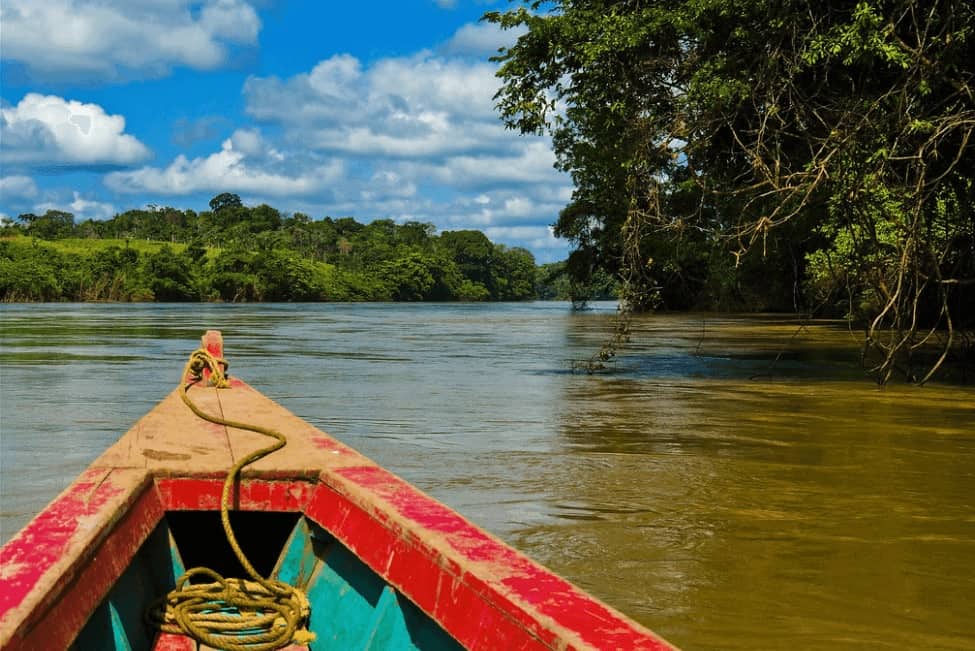
Disclaimer: This post may contain affiliate links. All hosted affiliate links follow our editorial policies .
The Dulce River, or “Sweet” River, is one of the most overlooked places to visit in Guatemala.
Popular Guatemala attractions such as the colonial city of Antigua and the ancient ruins of Tikal get plenty of international press. But the Rio Dulce is one of the lesser explored natural wonders you’ll find scattered about this culturally rich and historically maligned country.
In truth, Guatemala is a fantastic destination for budget-conscious backpackers, high-end ecotourism enthusiasts, or just about anyone seeking unique adventures and an interesting change of pace.
The Central American hotspot can put you atop an active volcano, in the depths of the jungle scaling ancient pyramids, or– when visiting Rio Dulce– exploring the country’s Caribbean coastline.
Measuring just 27 miles long, the Dulce River is fairly short. It stretches between Guatemala’s largest lake, Lago Izabal, and the Caribbean Sea, passing through towns like Fronteras and Livingston along the way.
Though petite, the Rio Dulce is a big-time biological marvel, with a diversity of flora and fauna rivaling any other place outside of the Amazon River . It’s also home to several distinct cultures, including multiple indigenous Mayan tribes and the Afro-Caribbean Garifuna people.
READ MORE: 40 Things You Should Know Before Traveling to Guatemala
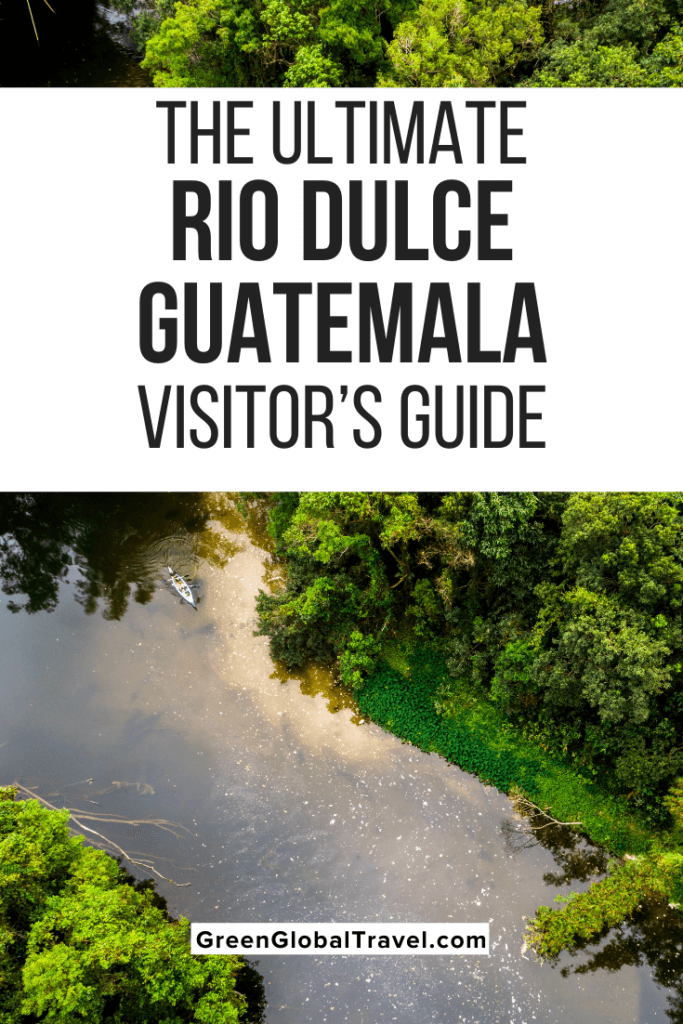
Rio Dulce, Guatemala Contents
- Volunteer with Casa Guatemala
- Visit Castillo de San Felipe
- Swim at Finca El Paraiso Hot Springs
- Boating on Lago de Izabal
- Hiking the Mayan Ruins at Quiriguá
- Take a Rio Dulce National Park Boat Tour
Rio Dulce Hotels
Exploring the towns along the rio dulce, how to get to fronteras, guatemala, fronteras hotels, visiting livingston, guatemala, how to get to livingston, things to do in livingston, livingston hotels.
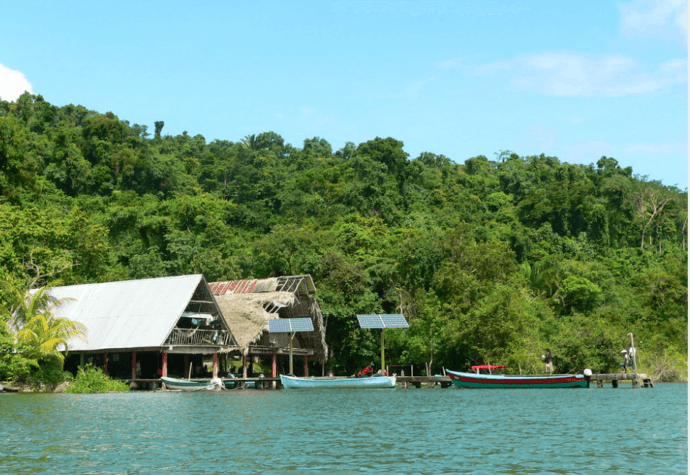
6 Things to Do in Rio Dulce, Guatemala
Of Guatemala’s three UNESCO Sites , one is located just down the road from Rio Dulce.
The sweet river is also home to environmentally detrimental banana, rubber, and palm oil plantations . Yet somehow it contains unimaginably rich swaths of wilderness and waterways.
They are Monkeys in the trees, and Manatees in the seas. There’s a colonial fort. There are riverside restaurants. In short, there are plenty of things to do in Rio Dulce.
1. Volunteer with Casa Guatemala
Casa Guatemala has been working on behalf of indigenous children from the villages around Rio Dulce for decades now, since 1987.
Casa Guatemala provides health care, education, nutrition, love, and homes for at-risk children with no parents (or families that can’t afford to take care of them).
Tours and volunteer opportunities can be arranged at Backpacker’s Hostel , a non-profit hotel/ restaurant on the south side of the bridge in Las Fronteras.
Casa Guatemala can only be reached by boat.
READ MORE: The Top 15 Things to Do in Antigua, Guatemala

2. Visit Castillo de San Felipe
At the entrance of Lake Izabal, the narrowest point of the Rio Dulce, you’ll find Castillo de San Felipe (Guatemala, not to be confused with the more famous one in Cartagena, Colombia ).
This old Spanish fort that was once used to protect the town and lake from pirates.
One of the towers here has remained intact since 1604, but the fort itself has been destroyed on more than one occasion. Several other towers were added in the 17th century. Then, in 1797, more additions were engineered.
In 1999, el Castillo was damaged by an earthquake. The fort is currently on UNESCO’s tentative list of World Heritage Sites .
READ MORE: 12 Odd Intangible Cultural Practices UNESCO Protects
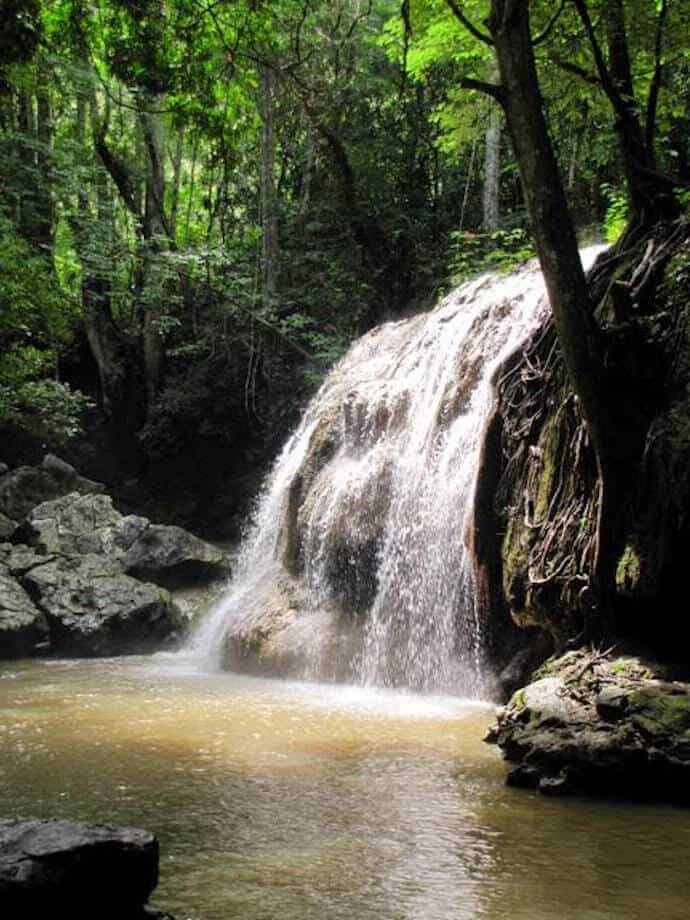
3. Swim at Finca El Paraiso Hot Springs
After a ride that sweeps visitors past huge expanses of banana plantations, Finca El Paraiso has an amazing hot springs waterfall that feeds into a cool mountain stream.
For just a few bucks, visitors are allowed to swim, take mud baths, and relax in the hot springs. It’s a simple morning or afternoon trip from town and back, but it’s well worth the time.
Getting here is a great adventure, and the blend of rusticity and comfort of semi-organization make the falls itself feel the same.
READ MORE: 20 of the World’s Biggest Waterfalls (By Continent)
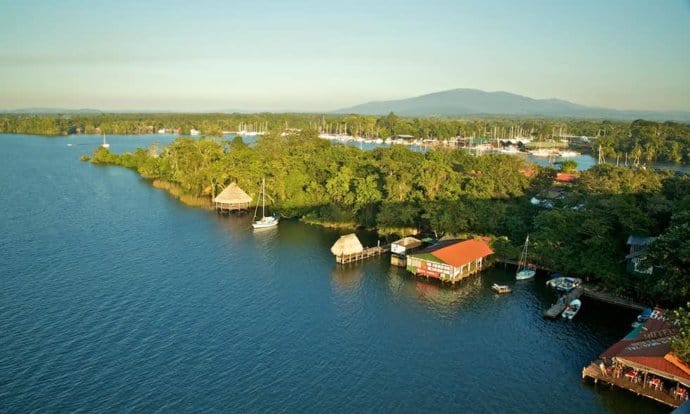
4. Boating on Lago de Izabal
Measuring approximately 30 miles long and 15 miles wide, Lake Izabal is the largest in Guatemala.
Also known as the Golfo Dulce , the lake is about 60 feet at its deepest, and only 3 feet above sea level. Its coastlines are dotted with thatch-roofed restaurants and hotels, as well as Mayan villages.
Lago de Izabal (as it’s known by locals) offers plenty of water-based recreation activities, including boating, kayaking , jet skiing, swimming, and fishing .
There’s also lots of wildlife here, such as Manatees, Howler Monkeys, and 100+ species of birds .
READ MORE: The 20 Largest Lakes in the World (By Continent)
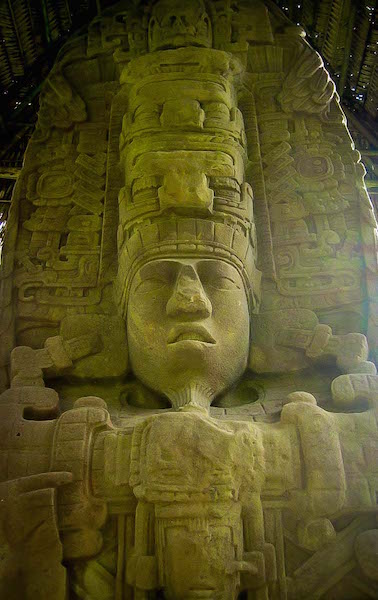
5. Hiking the Mayan Ruins at Quiriguá
The most overlooked of Guatemala’s UNESCO sites, Quiriguá is a collection of ancient Mayan ruins in an area believed to have been occupied as early as 400 BC.
While Tikal may be best known for its towering pyramids, Quiriguá is renowned amongst all Mayan sites for its abundance of stelas and statues.
As you can see in the photo above, the intricacy with which these monuments are carved is truly astounding.
With its proximity to the Motagua River, Quiriguá was ideally situated for controlling the trade of jade and cacao from the Guatemalan highlands.
READ MORE: The 16 Best Mayan Ruins to Explore
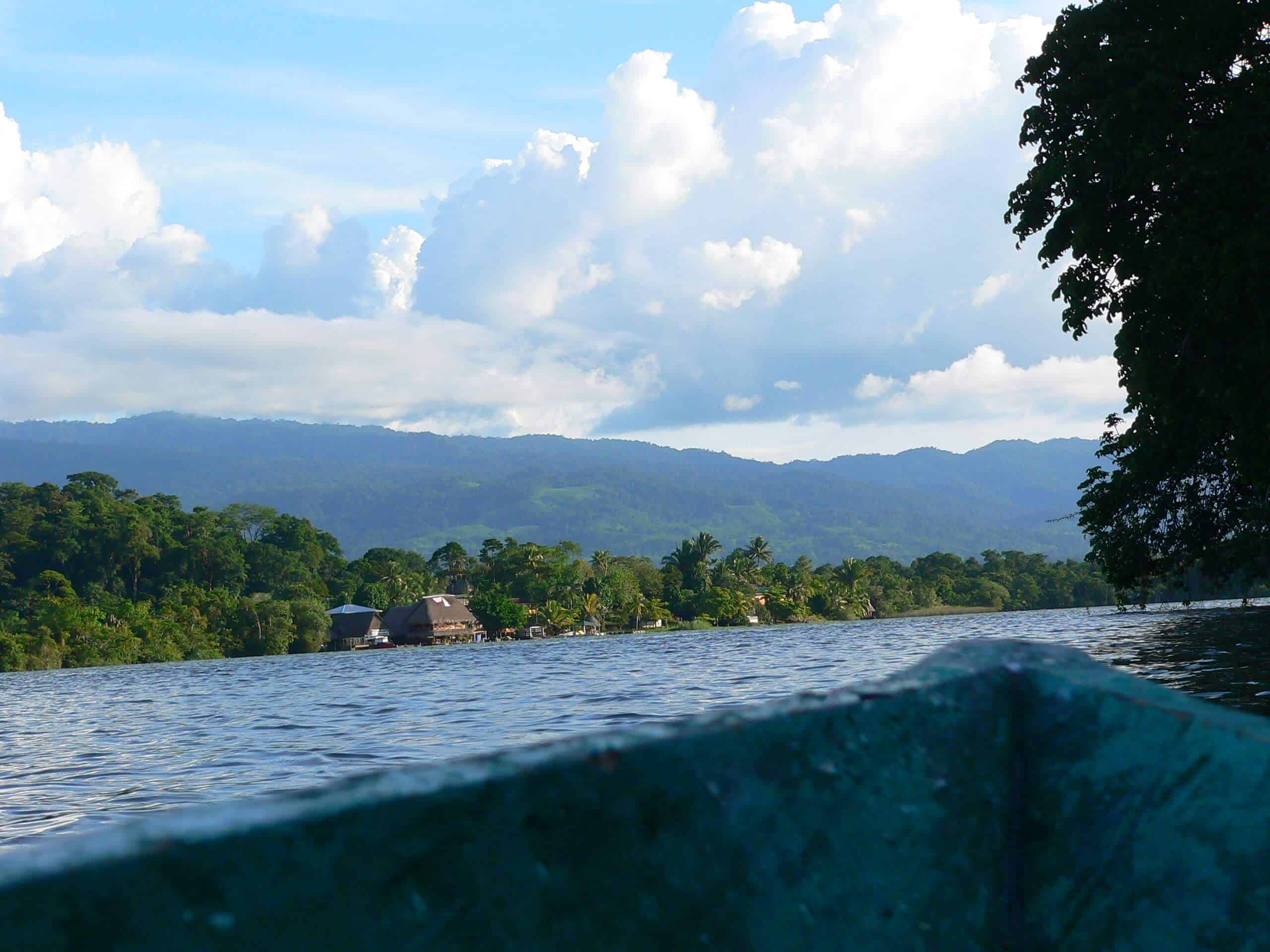
6. Take a Rio Dulce National Park Boat Tour
Much of what’s happening in this area requires taking a boat tour. The Rio Dulce National Park boat tour involves swimming, visiting the park (including Castillo de San Felipe), and shopping for artisan goods.
The more impressive boat ride is the lancha (a kind of taxi boat) from Las Fronteras to Livingston, which traverses the entirety of the Rio Dulce proper.
The river cuts through throngs of lush tropical forests as well as deep limestone canyon walls, which are often lined with Pelicans and various other water birds.
READ MORE: The World’s Best Small Ship Cruises
So if you ask locals about “ hoteles en Rio Dulce ,” they’ll more than likely refer you to a place in Fronteras de Guatemala.
There are plenty of accommodations along the river in this vicinity, and we’ll discuss those in the Fronteras section below.
READ MORE: The World’s Longest Rivers
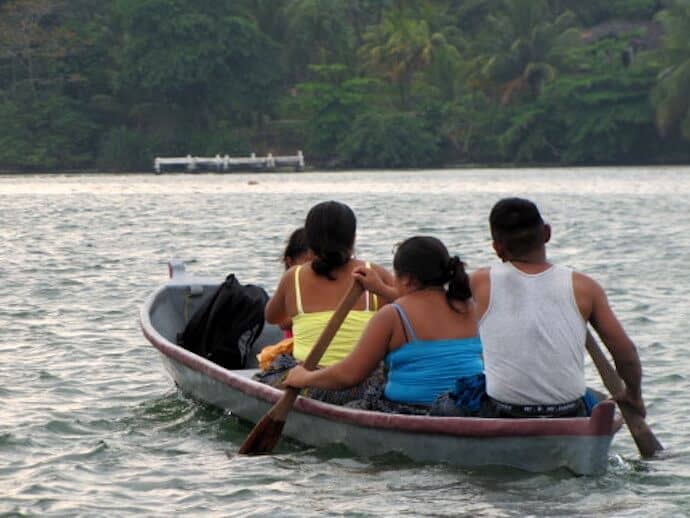
For the most part, the Rio Dulce is bordered by indigenous villages and the occasional rustic guesthouse.
At the inland end of the river is the town of Fronteras, which is often referred to simply as Rio Dulce. At the Caribbean end is the town of Livingston.
While neither of these towns are showstoppers in and of themselves, they are the jumping off points for lots of things to do along the river.
From Antigua, there is no direct bus or shuttle to Fronteras. But there are plenty of shuttle-to-coach combinations.
The best choice in my opinion is Litegua , which offers its own Fronteras bus shuttle (rather than a tour company’s) and coordinates the timing appropriately. It’s also the cheapest option.
Despite what some tour operators told me, the trip always involves a shuttle and bus from Guatemala City.
From Tikal, there are any number of buses leaving Flores (the main spot for accommodation when visiting Tikal National Park) that will drop passengers off in Rio Dulce/Fronteras. It’s the halfway point between Tikal and Guatemala City, so basically all routes go through the tiny town.
READ MORE: The Chicken Bus, Guatemala’s Unusual Mode of Transportation
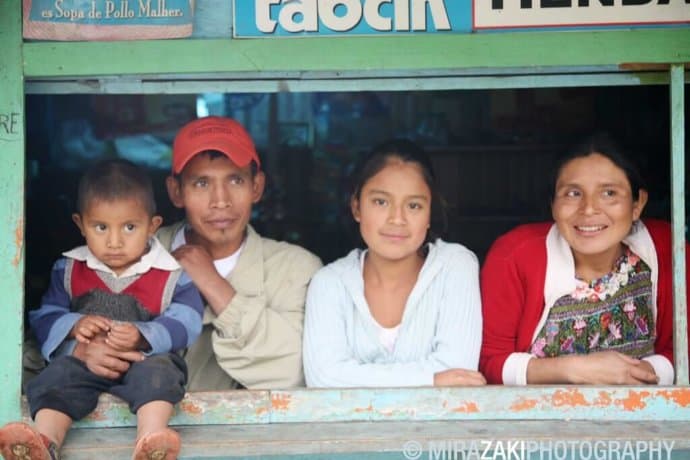
Things to Do in Fronteras
There is plenty to do around Fronteras, much of which we’ve discussed above. But the town itself more or less consists of just two streets, one of which you’ll have seen on the ride in.
The other offers not much more than a few restaurants, with the road eventually disappearing into the jungle and skirting the north side of Lago de Izabal .
That said, there is a quaint little market to visit in town. And there are some nice riverside restaurants, in particular the Sundog Café and Hotel Backpackers.
Food and seating at both places are notably good, though not necessarily traditional. Hotel Backpackers requires either a walk or tuk-tuk ride across the bridge, which provides amazing views of the river and lake.
READ MORE: 50 Fascinating Facts About Guatemalan Culture
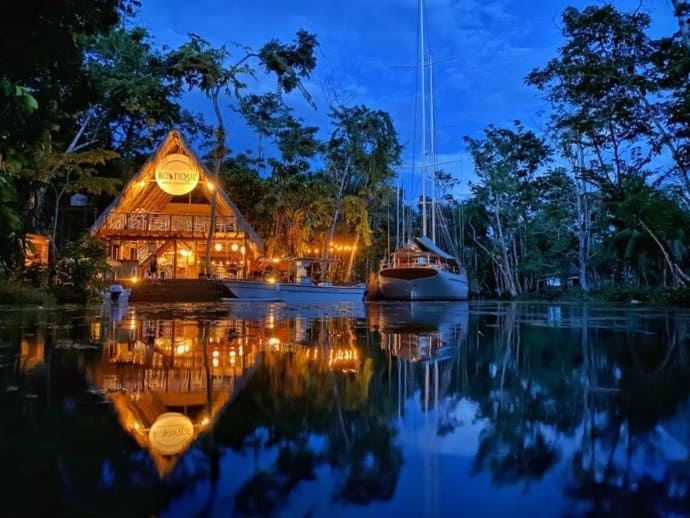
Most of the worthwhile hotels in Fronteras are actually just outside of the town, along the Rio Dulce tributaries and coastline. But most of them will usually come pick you up in a boat for free from either the Sundog Café or Hotel Backpackers.
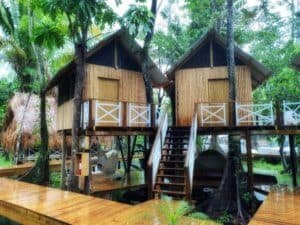
This laid-back hotel offers charming over-water bungalows, ranging in size from 4-person mixed dorms to deluxe suites and a holiday home big enough for families. There’s also a free shuttle service, full bar, and watersports such as sailing and paddle boarding. All at surprisingly affordable prices!
Check Prices at Booking.com
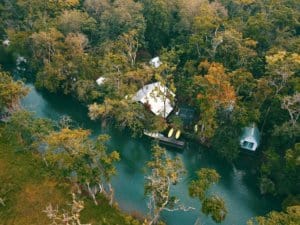
Located close to Lake Izabal and Castillo de San Felipe, this lovely little eco lodge offers one 8-bed dorm and various double rooms (all with shared bathrooms). The on-site restaurant/bar gets rave reviews, and there’s free WiFi, private parking, a private beach, and water sports facilities.
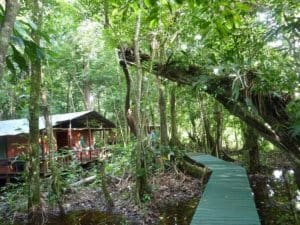
One of the nicer properties in the budget-friendly Rio Dulce/Izabal area, this relaxing retreat is right on the water, surrounded by forest. They have 6-bed hostel-style rooms as well as couples-friendly doubles, all with free wi-fi, shuttle service to Fronteras, and kayaks to explore the surrounding swamps.
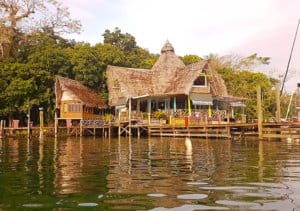
One of Booking.com’s top picks in Fronteras, this hotel sits on the Tortugal peninsula, which offers cool breezes and killer Rio Dulce views. Rooms range from charming bungalows and cottages to a 5-bedroom chalet that sleeps nine. Our favorite feature is the floating sun deck on the river with cozy loungers.
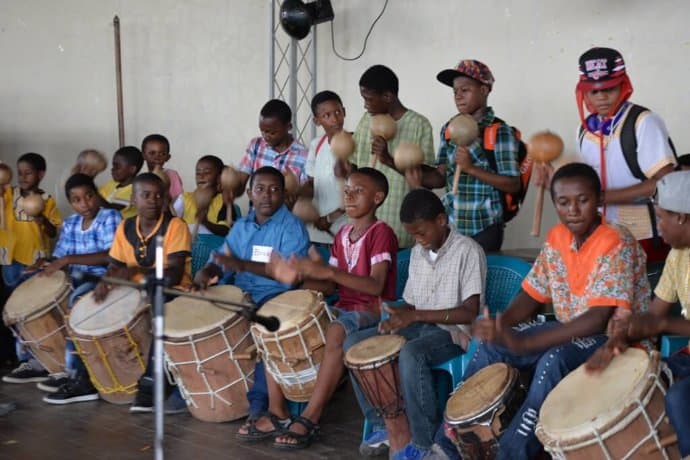
Livingston is on the Caribbean coast of Guatemala, where the Rio Dulce feeds into the sea. It’s unique to the rest of the country because English is widely spoken here.
Instead of Mayan, the most prominent culture in the town is Garifuna— which feels a bit like Rastafari due to its Afro-Caribbean origins, but is really its own unique thing.
To get to Livingston, one has to be going to Livingston, because it isn’t actually accessible by road. There are three main routes in:
- From Las Fronteras de Guatemala : From the dock under the bridge in Las Fronteras, there are a couple of boats a day that go to Livingston. The trip takes about an hour. Buses to Las Fronteras are regular from either Guatemala City or Flores.
- From Puerto Barrios : Puerto Barrios is the main port city on the Caribbean coast of Guatemala. To be blunt, it’s not particularly attractive, and is little more than a through station for getting to Livingston or Belize . Buses to Puerto Barrios leave regularly from Guatemala City, or it’s possible to get a collective from Las Fronteras. From Puerto Barrios, the boat ride is about 45 minutes.
- From Punta Gorda, Belize : For those coming to Guatemala from southern Belize , this is the fastest way to get to Guatemala. The road route goes all the way back up north to Tikal, and takes something like 12 hours. The boat from Punta Gorda (about 45 minutes) stops in Livingston and continues on to Puerto Barrios.
READ MORE: Scuba Diving the Belize Barrier Reef
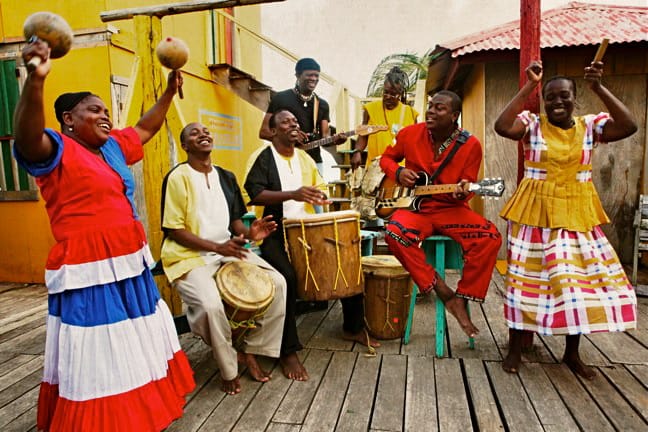
The main draw of travel to Livingston, Guatemala is the unique Garifuna culture there.
The Garifuna people live in a few settlements along the Caribbean coasts of Belize, Guatemala , Honduras, and Nicaragua . Some Garifuna still live in the islands of St. Vincent and the Grenadines, where they originated. But poor relations with the Colonial British led most of them to leave.
Garifuna history is rooted in slavery. They are a mixed-race people descended from Africans and indigenous Caribs. In the 1600s, the Caribs successfully resisted working as laborers for French sugar and cacao plantations, which prompted the import of slaves from sub-Saharan Africa.
The Caribs (a.k.a. the Kalinago ) and Africans meshed to make the Garifuna. Over the next couple of centuries, the Garifuna and French/British battled until the Garifuna were eventually exiled from St. Vincent. They ultimately settled along the coasts of Spanish colonies in Central America.
Within this unique Caribbean culture, music and dance are very important. The heart of Garifuna music is the drum, which is made from hollowed out hardwood and animal skin.
Starting in the 1970s, string and electric instruments were introduced in pop versions of the music, called Punta Rock. However, in recent years there has been a notable resurgence of traditional Garifuna music, especially in Belize.
The Garifuna have a close relationship with cassava, with the “Garifuna” name being derived from “Karifuna,” which translates to cassava-eating people. Garifuna women take the cassava root through a lengthy process to create delicious cassava bread, which is commonly eaten with fish, plantains, and/or gravy. There are plenty of opportunities to try this traditional cuisine in Livingston.
Also of note for the Livingston must-see list is the Seven Alters. Located 3 miles (or a short boat ride) outside of town, the Seven Alters is a series of pools and waterfalls surrounded by jungle.
Though not nearly as grand, they are suggestive of Semuc Champey , another of Guatemala’s amazing natural wonders.
READ MORE: The Garifuna Collective Preserves the Rich Garifuna Culture
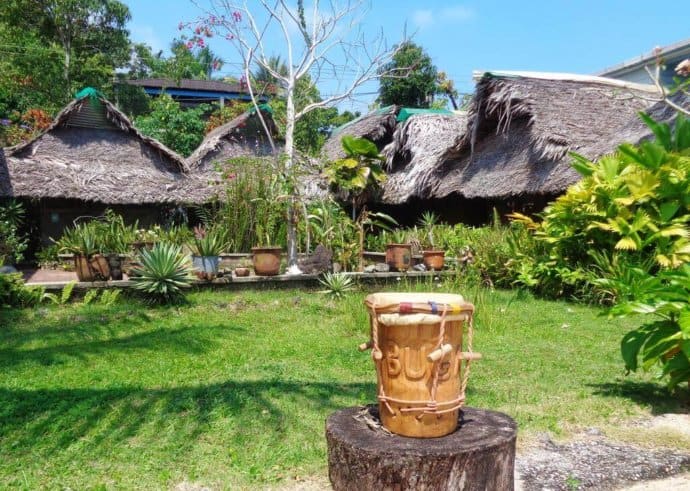
As with Las Fronteras, the best Livingston hotels and lodges aren’t actually located in the tiny town, but along the Rio Dulce. Most of these accommodations will come and pick you up in Livingston.
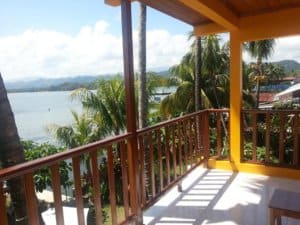
CASA NOSTRA
Offering double, triple, and family rooms with balconies, this family-run Livingston hotel offers excellent staff and stunning sunrise views over Lake Izabal from the sun terrace. There’s also a restaurant/lounge, garden, free Wifi, full breakfast, and activities such as hiking, cycling, and canoeing available.
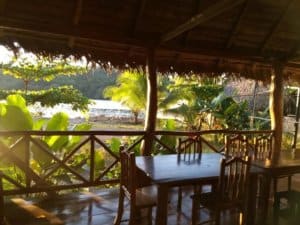
HOTEL CASA MAYA
Booking.com’s highest-rated hotel in Livingston (9.8), this hidden gem is owned by a Mayan family that goes out of its way to make guests feel welcome. Their charming bungalows are surrounded by the serenity of Rio Dulce’s natural beauty, with excellent food and gorgeous views of the river.
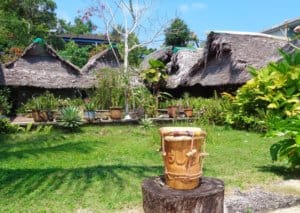
HOTEL LA CASA ROSADA
The second-highest-rated hotel in the area on Booking.com (9.1), Casa Escondida is one of the few hotels in the area offering air conditioning and private bathrooms in every twin, double, or deluxe room. The hotel also offers free WiFi, an outdoor swimming pool, and a restaurant on site.
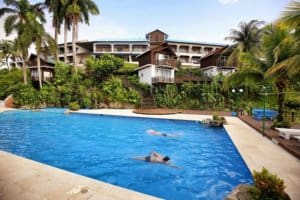
V ILLA CARIBE
Boasting balconies that offer views of Izabal Lake and the Caribbean Sea, this Livingston hotel makes the most of its excellent location. Its spacious rooms feature Caribbean decor and ceiling fans, and the outdoor swimming pool is refreshing on hot days. There’s also a private beach, restaurant and café/bar on site.
Traveling to Rio Dulce, Guatemala?
Check out the following services we use!
DollarFlightClub or Airfarewatchdog to find a cheap plane tickets.
Booking.com or Agoda to find a hotel deals.
Viator for a stellar day tour around Rio Dulce.
Lonely Planet for Travel Guides.
World Nomads for Travel Insurance.
Rental Cars.com for affordable Car Rentals.
TrustedHousesitters we’ve found great pet sitters to watch our house and love on our two dogs!
Looking for essential Travel Gear? Check out these great options!
The Best Travel Clothes for Women & Men The Best Travel Shoes Cool Camping Gear The Best Backpacks for Travelers
–by Jonathon Engels & Bret Love; lead image by guillenperez via CC BY-ND 2.0
About the Author
The financially unfortunate combination of travel enthusiast, freelance writer, and vegan gardener, Jonathon Engels whittled and whistled himself into a life that gives him cause to continually scribble about it. He has lived as an expat for over a decade, worked in nearly a dozen countries, and visited dozens of others in the meantime, subjecting the planet to a fiery mix of permaculture, music, and plant-based cooking. More of his work can be found at Jonathon Engels: A Life About.
As Seen On…

Join the 300,000+ people who follow Green Global Travel’s Blog and Social Media
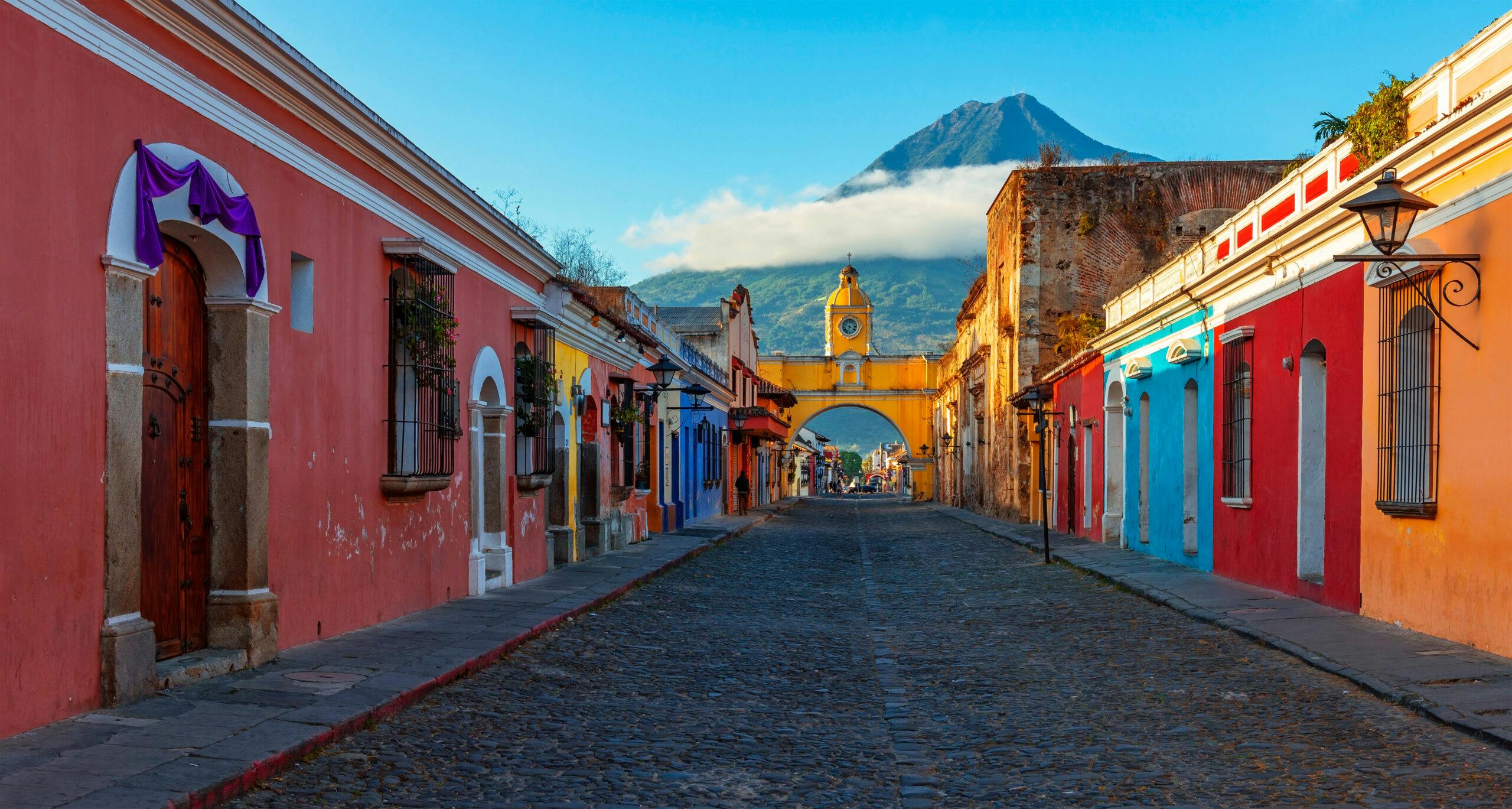
Guatemala vacations
Craft your unique guatemala trip with experienced local experts, nature and history abound in the land of eternal spring, this mountainous land, swathed in pristine rainforests and steeped in ancient mayan culture, is a joy to discover. mysterious abandoned cities lie tangled amongst the jungles of the north, while colonial architecture adorns cities and towns. indigenous highland villages retain their mayan roots with rainbow-hued fabrics and religious rituals. it is this cultural mix that makes guatemala so exciting. natural beauty abounds too, with soaring mountains and volcanoes, rushing rivers, wide lakes and deep caves. guatemala even boasts a pacific coast and its own little corner of the caribbean..

We’ve put together some ideas for you
We’re here in Guatemala ready to plan your trip with you, just the way you like it.
Sorry, looks like we don’t have any trip ideas that match this search
Not to worry though, all our trips are tailor-made anyway so your local expert will help plan your itinerary just the way you like it.
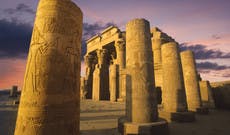
Private tour, permanent guide
Private transfer, guide on excursions
Organized Hotels/transfer, no guide
Self-driving
Join a group tour

Your Guatemala trip, just the way you like it
Our local experts in Guatemala are ready to help plan your perfect itinerary. Tailor-made, made easy.
What our travelers are saying
Just booked again.
" We have used TravelLocal's service three times and all three trips, though very different, have been excellent. Have just booked another trip through them for next month! "
Exemplary customer service
" TravelLocal gave us exemplary customer service, accommodating our requests and proposing an itinerary that suited us perfectly. The price, although expensive, reflected the excellence of our three-week trip. "
Exceptional service
" Exceptional service, from start to finish. They curated an incredible itinerary for our trip. By far the best customer experience I have ever had with a travel agent, I am a raving fan and will be recommending them to everyone who will listen! "
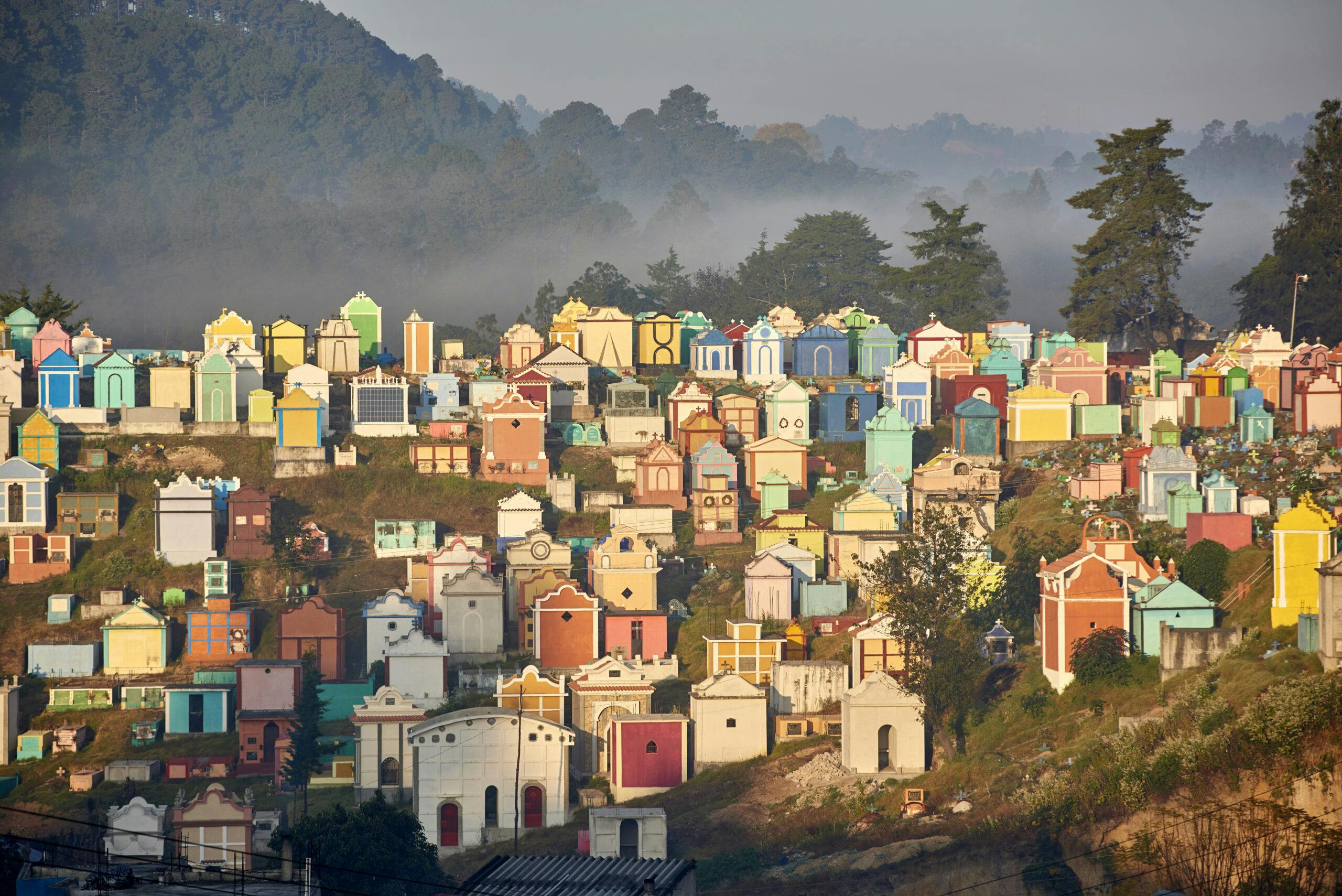
The Day of the Dead traditions in Guatemala
October 17, 2016

Interview with one of our local partners in Guatemala
July 29, 2024
Reimagine travel with us
Join our newsletter for more inspiration, local expertise, and updates on how we’re making travel a force for good.
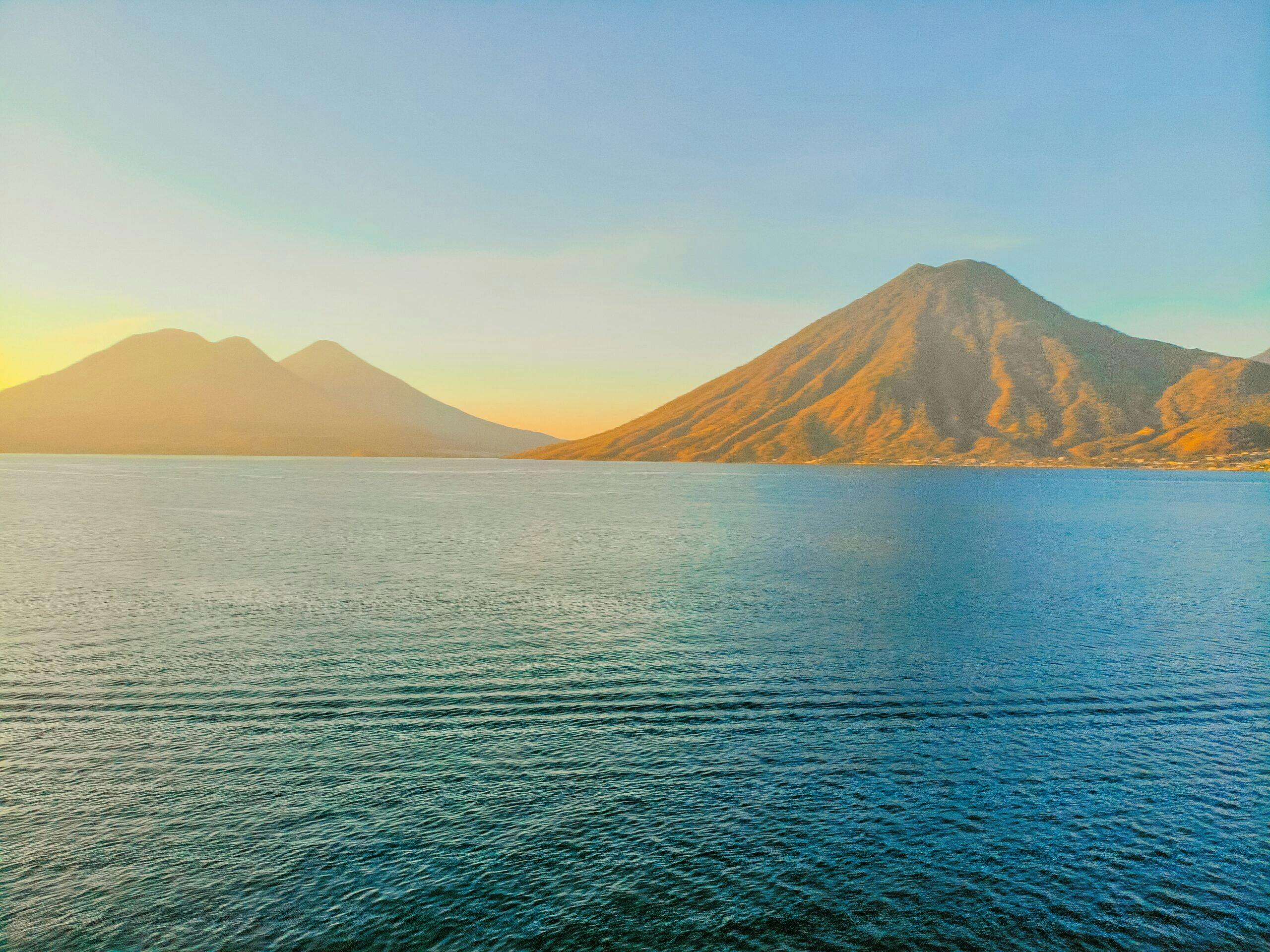
We're reimagining a fairer way to visit Guatemala
Your trip, their local expertise.
Our local in-destination experts are here to help you plan the most unique, authentic trips.
Reimagining travel
Travel that benefits all: our environment, ecosystems, local partners, and travelers.
Tailor-made, made easy
Travel with confidence with our flexible terms and ASTA membership.
- Skip to main content
- Skip to "About this site"
Language selection
Search travel.gc.ca.
Help us to improve our website. Take our survey !
COVID-19: travel health notice for all travellers
Guatemala travel advice
Latest updates: Health – editorial update
Last updated: September 9, 2024 16:06 ET
On this page
Safety and security, entry and exit requirements, laws and culture, natural disasters and climate, guatemala - exercise a high degree of caution.
Exercise a high degree of caution in Guatemala due to high levels of violent crime, roadblocks, strikes and demonstrations that occur throughout the country.
Regional advisories - Avoid non-essential travel
Within Guatemala City:
Municipalities:
- Amatitlán
- San José del Golfo
- San Raymundo
- Villa Nueva
Departments:
Back to top
Violent crime
Violent crime, including homicides, is common in Guatemala. Due to a lack of resources within the police force, arrest and detention rates are quite low. There have been incidents involving deceptive police officers who commit petty crimes, while other officers have reportedly been involved in sexual assault cases.
Most incidents are drug- and gang-related. They occur throughout the country, including in tourist destinations. Travellers have been attacked when visiting volcanoes and other tourist sites. Rifles and handguns are very common.
Criminals perceive foreigners as wealthy. As a result, travellers are often victims of robbery and carjacking. They have also been subject to armed assault and sexual assault, including rape.
Incidents of armed robbery occur daily on public buses. Buses are frequently targeted by gangs, who may hurl grenades or fire shots as a way of ensuring compliance with their demands or to settle accounts. Criminals have attacked drivers, fare collectors and passengers.
Due to very high levels of violent crime, you should avoid non-essential travel to certain:
- zones in Guatemala City
- municipalities in Guatemala and Escuintla departments
- departments along the borders with El Salvador and Honduras
- highways throughout the country
Crimes that occur in these areas include:
- kidnappings
- sexual assaults
Petty crime
Petty crime, such as pickpocketing and purse snatching, is prevalent in urban and tourist areas, especially in:
- national parks
- other crowded places
Crime tends to increase during the holiday seasons.
Schemes often involve some form of distraction. Criminals frequently operate in groups and, increasingly, on motorcycles. Typically, two men on a motorcycle accost a pedestrian or driver stuck in traffic and demand valuables.
Some criminals also pose as police officers. They may tell you they are drug enforcement officers and then take you to a side road where they steal everything from you. Victims who have resisted have been injured or killed.
If travelling to Guatemala:
- don’t display signs of affluence, especially upon arrival at the airport, where travellers have been followed and robbed or carjacked en route to Guatemala City and Antigua
- keep laptop computers, mobile phones and other personal electronic devices out of sight, and refrain from using them in public
- ensure that your belongings, including passports and other travel documents, are secure at all times
- carry only a copy of the identification page of your passport and enough money for the day
- if threatened by robbers, do not resist: hand over your valuables and cash immediately
Express kidnappings
Express kidnappings have occurred. The kidnappers usually force their victims to withdraw funds from an ATM or to arrange for family or friends to pay the ransom. Criminal taxi drivers often use this ploy. They first pick up the victim and then stop to pick up associates.
- Be cautious of strangers
- Avoid travelling alone, especially at night
- Avoid isolated areas and secondary roads
- Avoid low-cost hotels with poor security
- Avoid excessive alcohol and narcotic consumption, as it can make you a more vulnerable target for criminals
Border areas
Border areas often see higher levels of criminal activity and violence. Crime rates are high near all border crossings in Guatemala, but are worse near unofficial ones.
Drug-related armed attacks occur in departments close to all borders. The southwestern department of San Marcos at the Guatemala-Mexico border and the zone at the border with Belize are especially affected.
There is a heightened security presence at the official Guatemala-Mexico border points due to increased migration flows. Military and police forces conduct random vehicle searches along all borders. Wait times may be long.
Many border posts close for lunch and at dusk.
- Travel only through official border crossings
- Allow enough time for border formalities
- Cross only during the daytime and allow enough time to reach your destination or a major city before dark
2SLGBTQI+ persons
Discrimination against 2SLGBTQI+ persons is common.
There have been violent attacks against 2SLGBTQI+ persons.
Travel and your sexual orientation, gender identity, gender expression and sex characteristics
Credit card and ATM fraud occurs.
When using debit or credit cards:
- pay careful attention when others are handling your cards
- use ATMs located in public areas or inside a bank or business
- avoid using card readers with an irregular or unusual feature
- cover the keypad with one hand when entering your PIN
- check for any unauthorized transactions on your account statements
Overseas fraud
Demonstrations
Demonstrations take place frequently. Even peaceful demonstrations can turn violent at any time. They can also lead to disruptions to traffic and public transportation.
If you participate in demonstrations as a foreigner, you may face detention, deportation, and the denial of future entry into Guatemala.
- Avoid areas where demonstrations and large gatherings are taking place
- Follow the instructions of local authorities
- Monitor local media for up-to-date information on the situation
Useful links
- Mass gatherings (large-scale events)
- Protests and blockades listed by date – Government of Guatemala (in Spanish)
- Tourist assistance website – Instituto Guatemalteco de Turismo (INGUAT)
Vigilante justice
Vigilante justice has increased in rural areas, resulting in lynchings of suspected child abductors, extortionists and other criminals.
Photography
Many people in Guatemala fear that children are being kidnapped for illegal adoption or sexual abuse. Photographing children and women, especially in areas with Indigenous presence, may result in exacerbating this fear. Violent incidents involving foreigners taking photos have occurred.
Avoid approaching or photographing children and women, especially in Indigenous communities.
Women’s safety
Women travelling alone may be subject to some forms of harassment and verbal abuse.
Incidents of sexual assault have also occurred, including on buses. Some tourist service-providers build trusting relationships with female tourists and then sexually assault them.
- Avoid travelling alone, with informal guides or with strangers, even if they appear friendly and helpful
- Use only reputable tour guides or buses
- Ensure the tour guide has a name tag with the name of the tour company
Advice for women travellers
Spiked food and drinks
The spiking of drinks is a problem in tourist areas, especially in Antigua. Never leave food or drinks unattended or in the care of strangers. Be wary of accepting snacks, beverages, gum or cigarettes from new acquaintances, including taxi drivers. These items may contain drugs that could put you at risk of sexual assault and robbery.
Mountain activities, such as hiking, can be dangerous, especially if they are not well-organized. Trails are not always marked and weather conditions can change rapidly, even in summer.
Some volcanoes are at high altitude, with sub-zero temperatures at night. Warm and waterproof attire is essential. Local tour companies might underestimate the risk of hypothermia.
There is no mountain rescue service in Guatemala.
If you intend on hiking, including on volcanoes:
- never do so alone and always hire an experienced guide from a reputable company
- buy travel insurance that includes helicopter rescue and medical evacuation
- ensure that your physical condition is good enough to meet the challenges of your activity
- ensure that you’re properly equipped
- stay informed about weather and other conditions that may pose a hazard
- inform a family member or friend of your itinerary
- know the symptoms of acute altitude sickness, which can be fatal
- obtain detailed information on hiking routes before setting out and do not venture off marked trails
Water activities
Coastal waters can be dangerous. Riptides are common.
Not all beaches have lifeguards or warning flags.
- Exercise caution when swimming
- Don’t swim alone, after hours or outside marked areas
- Consult residents and tour operators for information on possible hazards and safe swimming areas
Water safety abroad
Adventure tourism
Tour operators may not adhere to international standards.
If you participate in adventure activities, such as zip-lining, diving and whitewater rafting:
- choose a well-established and reputable company that has insurance
- make sure safety equipment, such as helmets and life jackets, are available and in good condition
- make sure your travel insurance covers the recreational activities you choose
- avoid challenging rivers, such as the Cahabón, Los Esclavos, Nahualate and Naranjo rivers, if you don’t have previous rafting experience
If in doubt concerning the safety of the facilities or equipment, don’t use them.
Road travel
Road conditions.
Road safety and road conditions can vary greatly throughout the country. While most roads in urban areas are in fair condition, travel on secondary streets and rural roads can be hazardous due to:
- poor maintenance and lighting
- poorly maintained vehicles
- lack of road signs
- pedestrians on the road
- steep and winding mountain roads
- mudslides and rock slides during the rainy season, which can also affect main highways in mountainous regions
Road safety
Local drivers generally don’t respect traffic laws. They are often reckless. Driving under the influence of alcohol is also common.
There is heavy traffic on:
- the Pan-American Highway (CA-1)
- the road from Guatemala City to the Atlantic Ocean (CA-9)
Police presence is scarce on:
- the isolated dirt roads near Lake Atitlan
- the road from Godínez to Panajachel
Seek advice from a registered travel agency if you plan off-road travel in the remote highlands of Petén to ensure you’re prepared and properly equipped.
Roadblocks erected because of roadwork are common, particularly in the following northern and western departments:
- Alta Verapaz
- Huehuetenango
- Petén
- Quiché
These roadblocks may cause substantial delays.
Illegal roadblocks are also frequent. They can occur on the main roads leading to Guatemala City’s La Aurora International Airport.
Throughout Guatemala:
- avoid travelling at night
- drive with car windows closed and doors locked at all times
- be prepared to change your travel plans in case of roadblocks
- don’t go through roadblocks without stopping, even if they appear unattended
PROVIAL, the government roadside assistance agency, patrols most of the major highways and provides updates on roads conditions.
PROVIAL - Directorate General of Road Safety and Protection (in Spanish)
Public transportation
Local public buses, known as “chicken buses”, are not safe. Most of the time, they are recycled school buses mechanically unreliable. They are often overcrowded. Unlicensed drivers often drive at excessive speeds. They are frequently involved in major road accidents, and serious crimes occur on board.
Avoid using chicken buses.
Privately owned bus lines, including Transmetro and Transurbano in Guatemala City, are safer, but passengers have been subject to attacks at stations. If you travel by bus:
- travel only during daylight hours
- make sure the transportation provider is reputable and reliable before booking
- confirm your drop-off location, because Guatemala City Council no longer allows some intercity buses to enter the city centre
Hotel-associated taxis and yellow cabs ( taxis amarillos ), which operate in Guatemala City, are considered safe. White taxis operate independently and are considered dangerous. They have been involved in cases of extortion, petty theft and other crimes.
- Avoid boarding taxis at taxi stands or flagging taxis in the street
- Avoid using white taxis
- If using hotel taxis, request the service at the front desk and always look for the hotel logo on the car
- When travelling by air, pre-arrange your pickup with your hotel prior to your arrival or use authorized airport taxis
- Note the driver's name on the picture identification badges, as well as the licence number
- Never share a taxi with strangers
- Make sure the driver doesn’t pick up other passengers along the way to your destination
- Negotiate the fare in advance
- Have small bills available for payment
Ridesharing services
Several ridesharing services are also available but safety varies depending on the company.
Ridesharing services drivers are sometimes targets of taxi drivers who oppose these services. As a result, some may ask you to sit in the front seat to hide the fact that they are providing a rideshare service.
- Use ridesharing services from a trusted app only
- Confirm the driver’s identity and the licence plate before getting in the car
Tuk-tuks / rickshaw taxis / moto taxis
These two- or three-wheeled motorcycles with passenger cabins are unsafe. While they operate with taxi licences, they are not regulated and are frequently involved in accidents.
Avoid riding in tuk-tuks, rickshaw taxis or moto taxis.
Illegal drug traders may operate vessels in Guatemalan waters. Boaters in the Rio Dulce area of Izabal have been the victim of violent armed attacks.
- Avoid boating at night
- Enter Guatemala only through official ports of entry staffed by Guatemalan immigration officers
- Use officially recognized docking and berthing facilities only
We do not make assessments on the compliance of foreign domestic airlines with international safety standards.
Information about foreign domestic airlines
Every country or territory decides who can enter or exit through its borders. The Government of Canada cannot intervene on your behalf if you do not meet your destination’s entry or exit requirements.
We have obtained the information on this page from the Guatemalan authorities. It can, however, change at any time.
Verify this information with the Foreign Representatives in Canada .
Entry requirements vary depending on the type of passport you use for travel.
Before you travel, check with your transportation company about passport requirements. Its rules on passport validity may be more stringent than the country’s entry rules.
Regular Canadian passport
Your passport must be valid for at least 6 months beyond the date you expect to leave Guatemala.
Passport for official travel
Different entry rules may apply.
Official travel
Passport with “X” gender identifier
While the Government of Canada issues passports with an “X” gender identifier, it cannot guarantee your entry or transit through other countries. You might face entry restrictions in countries that do not recognize the “X” gender identifier. Before you leave, check with the closest foreign representative for your destination.
Other travel documents
Different entry rules may apply when travelling with a temporary passport or an emergency travel document. Before you leave, check with the closest foreign representative for your destination.
- Foreign Representatives in Canada
- Canadian passports
Tourist visa: not required for stays of up to 90 days Business visa: not required for stays of up to 90 days Student visa: required
You may request an extension of up to 90 days from the Guatemala Directorate General of Migration. If you wish to conduct business or stay in Guatemala for a period exceeding 6 months, you require a visa.
Guatemala Directorate General of Migration – Government of Guatemala (in Spanish)
Entry stamp
When entering Guatemala by land or sea, you must obtain an entry stamp in your passport.
If you fail to present your entry stamp when departing Guatemala, you may be fined and experience delays.
If you enter Guatemala with a vehicle, you must comply with the deadline for leaving the country, which is indicated on the temporary importation form provided by Guatemalan customs at the port of entry. If you fail to leave Guatemala with your vehicle by the expiry date, you will be subject to a fine for the extra days.
Electronic declaration form
You must complete an electronic declaration form before arriving and leaving Guatemala. You will then receive a QR code. Keep your QR code in order to present it to authorities upon your arrival or departure.
Electronic declaration form - Government of Guatemala
Central America-4 Border Control Agreement
Under the terms of the Central America-4 Border Control Agreement (CA-4), Canadian tourists may travel freely within any of the following CA-4 countries:
- El Salvador
You can travel between these countries for up to 90 days without having to undergo entry and exit formalities at border immigration checkpoints.
You must still check in at immigration counters when you enter or exit these checkpoints.
The 90-day period begins at the first point of entry to any of the CA-4 countries. You will be fined if you exceed the 90-day limit.
You may request an extension of up to 90 days once a year. You must request this extension and pay the required fee at the Guatemala Directorate General of Migration before your first 90-day limit expires. Immigration authorities will determine the length of the extension.
Guatemala Directorate General of Migration (in Spanish)
- Children and travel
Children travelling with only one parent or with a third party must travel with a notarized letter of consent from the other parent, both parents or their guardian.
- Immigration exit requirements – Government of Guatemala (in Spanish)
- Recommended consent letter for children travelling abroad
- Travel with children
Yellow fever
Learn about potential entry requirements related to yellow fever (vaccines section).
Relevant Travel Health Notices
- Global Measles Notice - 13 March, 2024
- Zika virus: Advice for travellers - 31 August, 2023
- COVID-19 and International Travel - 13 March, 2024
- Dengue: Advice for travellers - 9 September, 2024
This section contains information on possible health risks and restrictions regularly found or ongoing in the destination. Follow this advice to lower your risk of becoming ill while travelling. Not all risks are listed below.
Consult a health care professional or visit a travel health clinic preferably 6 weeks before you travel to get personalized health advice and recommendations.
Routine vaccines
Be sure that your routine vaccinations , as per your province or territory , are up-to-date before travelling, regardless of your destination.
Some of these vaccinations include measles-mumps-rubella (MMR), diphtheria, tetanus, pertussis, polio, varicella (chickenpox), influenza and others.
Pre-travel vaccines and medications
You may be at risk for preventable diseases while travelling in this destination. Talk to a travel health professional about which medications or vaccines may be right for you, based on your destination and itinerary.
Yellow fever is a disease caused by a flavivirus from the bite of an infected mosquito.
Travellers get vaccinated either because it is required to enter a country or because it is recommended for their protection.
- There is no risk of yellow fever in this country.
Country Entry Requirement*
- Proof of vaccination is required if you are coming from or have transited through an airport of a country where yellow fever occurs.
Recommendation
- Vaccination is not recommended.
- Discuss travel plans, activities, and destinations with a health care professional.
- Contact a designated Yellow Fever Vaccination Centre well in advance of your trip to arrange for vaccination.
About Yellow Fever
Yellow Fever Vaccination Centres in Canada * It is important to note that country entry requirements may not reflect your risk of yellow fever at your destination. It is recommended that you contact the nearest diplomatic or consular office of the destination(s) you will be visiting to verify any additional entry requirements.
There is a risk of hepatitis A in this destination. It is a disease of the liver. People can get hepatitis A if they ingest contaminated food or water, eat foods prepared by an infectious person, or if they have close physical contact (such as oral-anal sex) with an infectious person, although casual contact among people does not spread the virus.
Practise safe food and water precautions and wash your hands often. Vaccination is recommended for all travellers to areas where hepatitis A is present.
Malaria is a serious and sometimes fatal disease that is caused by parasites spread through the bites of mosquitoes. There is a risk of malaria in certain areas and/or during a certain time of year in this destination.
Antimalarial medication may be recommended depending on your itinerary and the time of year you are travelling. Consult a health care professional or visit a travel health clinic before travelling to discuss your options. It is recommended to do this 6 weeks before travel, however, it is still a good idea any time before leaving. Protect yourself from mosquito bites at all times: • Cover your skin and use an approved insect repellent on uncovered skin. • Exclude mosquitoes from your living area with screening and/or closed, well-sealed doors and windows. • Use insecticide-treated bed nets if mosquitoes cannot be excluded from your living area. • Wear permethrin-treated clothing. If you develop symptoms similar to malaria when you are travelling or up to a year after you return home, see a health care professional immediately. Tell them where you have been travelling or living.
In this destination, rabies is commonly carried by dogs and some wildlife, including bats. Rabies is a deadly disease that spreads to humans primarily through bites or scratches from an infected animal. While travelling, take precautions , including keeping your distance from animals (including free-roaming dogs), and closely supervising children.
If you are bitten or scratched by a dog or other animal while travelling, immediately wash the wound with soap and clean water and see a health care professional. In this destination, rabies treatment may be limited or may not be available, therefore you may need to return to Canada for treatment.
Before travel, discuss rabies vaccination with a health care professional. It may be recommended for travellers who are at high risk of exposure (e.g., occupational risk such as veterinarians and wildlife workers, children, adventure travellers and spelunkers, and others in close contact with animals).
Measles is a highly contagious viral disease. It can spread quickly from person to person by direct contact and through droplets in the air.
Anyone who is not protected against measles is at risk of being infected with it when travelling internationally.
Regardless of where you are going, talk to a health care professional before travelling to make sure you are fully protected against measles.
Hepatitis B is a risk in every destination. It is a viral liver disease that is easily transmitted from one person to another through exposure to blood and body fluids containing the hepatitis B virus. Travellers who may be exposed to blood or other bodily fluids (e.g., through sexual contact, medical treatment, sharing needles, tattooing, acupuncture or occupational exposure) are at higher risk of getting hepatitis B.
Hepatitis B vaccination is recommended for all travellers. Prevent hepatitis B infection by practicing safe sex, only using new and sterile drug equipment, and only getting tattoos and piercings in settings that follow public health regulations and standards.
Coronavirus disease (COVID-19) is an infectious viral disease. It can spread from person to person by direct contact and through droplets in the air.
It is recommended that all eligible travellers complete a COVID-19 vaccine series along with any additional recommended doses in Canada before travelling. Evidence shows that vaccines are very effective at preventing severe illness, hospitalization and death from COVID-19. While vaccination provides better protection against serious illness, you may still be at risk of infection from the virus that causes COVID-19. Anyone who has not completed a vaccine series is at increased risk of being infected with the virus that causes COVID-19 and is at greater risk for severe disease when travelling internationally.
Before travelling, verify your destination’s COVID-19 vaccination entry/exit requirements. Regardless of where you are going, talk to a health care professional before travelling to make sure you are adequately protected against COVID-19.
The best way to protect yourself from seasonal influenza (flu) is to get vaccinated every year. Get the flu shot at least 2 weeks before travelling.
The flu occurs worldwide.
- In the Northern Hemisphere, the flu season usually runs from November to April.
- In the Southern Hemisphere, the flu season usually runs between April and October.
- In the tropics, there is flu activity year round.
The flu vaccine available in one hemisphere may only offer partial protection against the flu in the other hemisphere.
The flu virus spreads from person to person when they cough or sneeze or by touching objects and surfaces that have been contaminated with the virus. Clean your hands often and wear a mask if you have a fever or respiratory symptoms.
Safe food and water precautions
Many illnesses can be caused by eating food or drinking beverages contaminated by bacteria, parasites, toxins, or viruses, or by swimming or bathing in contaminated water.
- Learn more about food and water precautions to take to avoid getting sick by visiting our eat and drink safely abroad page. Remember: Boil it, cook it, peel it, or leave it!
- Avoid getting water into your eyes, mouth or nose when swimming or participating in activities in freshwater (streams, canals, lakes), particularly after flooding or heavy rain. Water may look clean but could still be polluted or contaminated.
- Avoid inhaling or swallowing water while bathing, showering, or swimming in pools or hot tubs.
Travellers' diarrhea is the most common illness affecting travellers. It is spread from eating or drinking contaminated food or water.
Risk of developing travellers' diarrhea increases when travelling in regions with poor standards of hygiene and sanitation. Practise safe food and water precautions.
The most important treatment for travellers' diarrhea is rehydration (drinking lots of fluids). Carry oral rehydration salts when travelling.
Typhoid is a bacterial infection spread by contaminated food or water. Risk is higher among children, travellers going to rural areas, travellers visiting friends and relatives or those travelling for a long period of time.
Travellers visiting regions with a risk of typhoid, especially those exposed to places with poor sanitation, should speak to a health care professional about vaccination.
Insect bite prevention
Many diseases are spread by the bites of infected insects such as mosquitoes, ticks, fleas or flies. When travelling to areas where infected insects may be present:
- Use insect repellent (bug spray) on exposed skin
- Cover up with light-coloured, loose clothes made of tightly woven materials such as nylon or polyester
- Minimize exposure to insects
- Use mosquito netting when sleeping outdoors or in buildings that are not fully enclosed
To learn more about how you can reduce your risk of infection and disease caused by bites, both at home and abroad, visit our insect bite prevention page.
Find out what types of insects are present where you’re travelling, when they’re most active, and the symptoms of the diseases they spread.
There is a risk of chikungunya in this country. The level of risk may vary by:
The virus that causes chikungunya is spread through the bite of an infected mosquito. It can cause fever and pain in the joints. In some cases, the joint pain can be severe and last for months or years.
Protect yourself from mosquito bites at all times.
Learn more:
Insect bite and pest prevention Chikungunya
American trypanosomiasis (Chagas disease) is a risk in this country. It is caused by a parasite spread by infected triatomine bugs. The infection can be inactive for decades, but humans can eventually develop complications causing disability and even death.
Risk is generally low for most travellers. Protect yourself from triatomine bugs, which are active at night, by using mosquito nets if staying in poorly-constructed housing. There is no vaccine available for Chagas disease.
- In this country, dengue is a risk to travellers. It is a viral disease spread to humans by mosquito bites.
- Dengue can cause flu-like symptoms. In some cases, it can lead to severe dengue, which can be fatal.
- The level of risk of dengue changes seasonally, and varies from year to year. The level of risk also varies between regions in a country and can depend on the elevation in the region.
- Mosquitoes carrying dengue typically bite during the daytime, particularly around sunrise and sunset.
- Protect yourself from mosquito bites . There is no vaccine or medication that protects against dengue.
Zika virus is a risk in this country.
Zika virus is primarily spread through the bite of an infected mosquito. It can also be sexually transmitted. Zika virus can cause serious birth defects.
During your trip:
- Prevent mosquito bites at all times.
- Use condoms correctly or avoid sexual contact, particularly if you are pregnant.
If you are pregnant or planning a pregnancy, you should discuss the potential risks of travelling to this destination with your health care provider. You may choose to avoid or postpone travel.
For more information, see Zika virus: Pregnant or planning a pregnancy.
Animal precautions
Some infections, such as rabies and influenza, can be shared between humans and animals. Certain types of activities may increase your chance of contact with animals, such as travelling in rural or forested areas, camping, hiking, and visiting wet markets (places where live animals are slaughtered and sold) or caves.
Travellers are cautioned to avoid contact with animals, including dogs, livestock (pigs, cows), monkeys, snakes, rodents, birds, and bats, and to avoid eating undercooked wild game.
Closely supervise children, as they are more likely to come in contact with animals.
Person-to-person infections
Stay home if you’re sick and practise proper cough and sneeze etiquette , which includes coughing or sneezing into a tissue or the bend of your arm, not your hand. Reduce your risk of colds, the flu and other illnesses by:
- washing your hands often
- avoiding or limiting the amount of time spent in closed spaces, crowded places, or at large-scale events (concerts, sporting events, rallies)
- avoiding close physical contact with people who may be showing symptoms of illness
Sexually transmitted infections (STIs) , HIV , and mpox are spread through blood and bodily fluids; use condoms, practise safe sex, and limit your number of sexual partners. Check with your local public health authority pre-travel to determine your eligibility for mpox vaccine.
Tuberculosis is an infection caused by bacteria and usually affects the lungs.
For most travellers the risk of tuberculosis is low.
Travellers who may be at high risk while travelling in regions with risk of tuberculosis should discuss pre- and post-travel options with a health care professional.
High-risk travellers include those visiting or working in prisons, refugee camps, homeless shelters, or hospitals, or travellers visiting friends and relatives.
Medical services and facilities
Good health care is limited to private hospitals and clinics in urban areas. Quality of care varies greatly throughout public or rural facilities.
Public facilities are often understaffed and experience shortages of basic supplies and medication.
Physicians and hospitals often expect immediate cash payment for medical care, though most private hospitals also accept credit cards.
Medical evacuation can be very expensive and you may need it in case of serious illness or injury.
Make sure you get travel insurance that includes coverage for medical evacuation and hospital stays.
Health and safety outside Canada
Medications
If you take prescription medications, you’re responsible for determining their legality in Guatemala.
- Bring sufficient quantities of your medication with you
- Always keep your medication in the original container
- Pack them in your carry-on luggage
- Carry a copy of your prescriptions
Keep in Mind...
The decision to travel is the sole responsibility of the traveller. The traveller is also responsible for his or her own personal safety.
Be prepared. Do not expect medical services to be the same as in Canada. Pack a travel health kit , especially if you will be travelling away from major city centres.
You must abide by local laws.
Learn about what you should do and how we can help if you are arrested or detained abroad .
Penalties for possession, use or trafficking of illegal drugs are severe. Convicted offenders can expect lengthy prison sentences.
Drugs, alcohol and travel
Dual citizenship
Dual citizenship is legally recognized in Guatemala.
If you are a Canadian citizen, but also a citizen of Guatemala, our ability to offer you consular services may be limited while you're there. You may also be subject to different entry/exit requirements .
Dual citizens
International Child Abduction
The Hague Convention on the Civil Aspects of International Child Abduction is an international treaty. It can help parents with the return of children who have been removed to or retained in certain countries in violation of custody rights. It does not apply between Canada and Guatemala.
If your child was wrongfully taken to, or is being held in Guatemala by an abducting parent:
- act as quickly as you can
- consult a lawyer in Canada and in Guatemala to explore all the legal options for the return of your child
- report the situation to the nearest Canadian government office abroad or to the Vulnerable Children's Consular Unit at Global Affairs Canada by calling the Emergency Watch and Response Centre
If your child was removed from a country other than Canada, consult a lawyer to determine if The Hague Convention applies.
Be aware that Canadian consular officials cannot interfere in private legal matters or in another country's judicial affairs.
- International Child Abductions: A guide for affected parents
- Canadian embassies and consulates by destination
- Request emergency assistance
Guatemalan law doesn’t criminalize sexual acts or relationships between individuals of the same sex.
However, 2SLGBTQI+ persons could be discriminated against based on their sexual orientation, gender identity, gender expression, or sex characteristics.
Investments
If you plan on buying property, or making other investments in Guatemala, seek legal advice in Canada and in Guatemala. Do so before making commitments. Related disputes could take time and be costly to resolve.
Dress and behaviour
Guatemala has many different and firmly held local beliefs and customs.
To avoid offending local sensitivities:
- dress conservatively
- behave discreetly
- respect religious and social traditions
Imports and exports
Customs authorities may enforce strict regulations concerning import or export of items such as antiquities and artefacts.
It is illegal to photograph:
- government buildings
- military installations and establishments
- the Presidential Palace
Don’t photograph children and women, especially in areas with Indigenous presence.
You can drive in Guatemala with your valid Canadian driver’s licence. You should carry an international driving permit.
If you are involved in a driving accident that results in injury or death, you may be taken into custody until responsibility for the accident is determined.
International Driving Permit
The currency in Guatemala is the Guatemalan quetzal (GTQ).
You cannot exchange Canadian dollars in Guatemala. Some ATMs will accept Canadian debit cards with a four-digit PIN. Canadian debit cards with a five-digit PIN are not accepted.
U.S. dollars may be exchanged for local currency at most major banks.
Forest fires occur between November and June. They can happen throughout the country, but the Petén area is usually the most affected.
The air quality in areas near active fires may deteriorate due to heavy smoke.
In case of a major fire:
- stay away from affected areas, particularly if you suffer from respiratory ailments
- follow the advice of local emergency services personnel
- monitor local media for up-to-date information on the situation
Hurricane season
Hurricanes usually occur from mid-May to the end of November. During this period, even small tropical storms can quickly develop into major hurricanes.
These severe storms can put you at risk and hamper the provision of essential services. You could face serious safety risks during a hurricane.
If you decide to travel to a coastal area during the hurricane season:
- be prepared to change your travel plans on short notice, including cutting short or cancelling your trip
- stay informed of the latest regional weather forecasts
- carry emergency contact information for your airline or tour operator
- follow the advice and instructions of local authorities
- Severe storms outside Canada
- Large-scale emergencies outside Canada
- Active storm tracking and hurricane watches and warnings – U.S. National Hurricane Center
Rainy season
The rainy season extends from mid-May to mid-November. Seasonal flooding can hamper overland travel and reduce the provision of essential services.
Flash floods and landslides are common. Roads may become impassable and bridges may be damaged.
Weather bulletins – National Institute of Volcanology and Meteorology (in Spanish)
Seismic activity
Earthquakes and tsunamis.
Guatemala is located in an active seismic zone. Earthquakes and tsunamis can occur.
A tsunami can occur within minutes of a nearby earthquake. However, the risk of tsunami can remain for several hours following the first tremor. If you’re staying on the coast, familiarize yourself with the region’s evacuation plans in the event of a tsunami warning.
There are four active volcanoes in Guatemala.
Eruptions may occur at any time. Series of tremors sometimes lead to evacuations of surrounding areas. Falling ash may also disrupt flights at La Aurora International Airport.
In the event of an earthquake or volcanic eruption:
- monitor local media to stay informed of the evolving situation
- follow the instructions of local authorities, including evacuation orders
- CONRED – National Coordinator for Disaster Reduction (in Spanish)
- Earthquakes – What to Do?
- Tsunami warning system – U.S. National Weather Service
- Latest earthquakes – U.S. Geological Survey
Local services
Emergency services exist but may be subject to certain limitations. In case of emergency, dial:
- police: 110 / 120
- medical assistance: 122 / 123
- firefighters: 122 / 123
Tourist assistance
Guatemalan authorities provide information and assistance to tourists via their ASISTUR and DISETUR programs. They may arrange security escorts for road travel or organized hiking activities.
INGUAT - The Guatemalan Tourist Institute
Consular assistance
For emergency consular assistance, call the Embassy of Canada to Guatemala, in Guatemala City, and follow the instructions. At any time, you may also contact the Emergency Watch and Response Centre in Ottawa.
The decision to travel is your choice and you are responsible for your personal safety abroad. We take the safety and security of Canadians abroad very seriously and provide credible and timely information in our Travel Advice to enable you to make well-informed decisions regarding your travel abroad.
The content on this page is provided for information only. While we make every effort to give you correct information, it is provided on an "as is" basis without warranty of any kind, expressed or implied. The Government of Canada does not assume responsibility and will not be liable for any damages in connection to the information provided.
If you need consular assistance while abroad, we will make every effort to help you. However, there may be constraints that will limit the ability of the Government of Canada to provide services.
Learn more about consular services .
Risk Levels
take normal security precautions.
Take similar precautions to those you would take in Canada.
Exercise a high degree of caution
There are certain safety and security concerns or the situation could change quickly. Be very cautious at all times, monitor local media and follow the instructions of local authorities.
IMPORTANT: The two levels below are official Government of Canada Travel Advisories and are issued when the safety and security of Canadians travelling or living in the country or region may be at risk.
Avoid non-essential travel
Your safety and security could be at risk. You should think about your need to travel to this country, territory or region based on family or business requirements, knowledge of or familiarity with the region, and other factors. If you are already there, think about whether you really need to be there. If you do not need to be there, you should think about leaving.
Avoid all travel
You should not travel to this country, territory or region. Your personal safety and security are at great risk. If you are already there, you should think about leaving if it is safe to do so.
Cookies on GOV.UK
We use some essential cookies to make this website work.
We’d like to set additional cookies to understand how you use GOV.UK, remember your settings and improve government services.
We also use cookies set by other sites to help us deliver content from their services.
You have accepted additional cookies. You can change your cookie settings at any time.
You have rejected additional cookies. You can change your cookie settings at any time.
Warnings and insurance
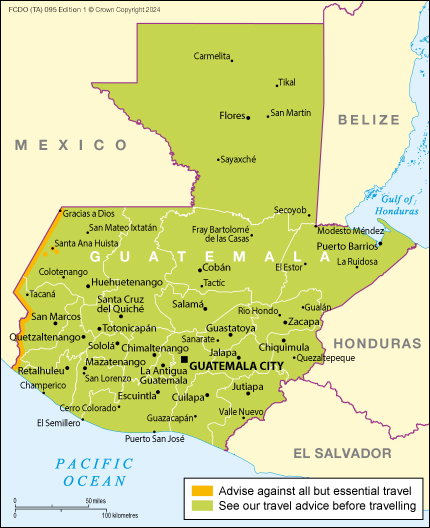
The Foreign, Commonwealth & Development Office ( FCDO ) provides advice about risks of travel to help British nationals make informed decisions. Find out more about FCDO travel advice .
Your travel insurance could be invalidated if you travel against advice from the Foreign, Commonwealth & Development Office (FCDO).
Areas where FCDO advises against all but essential travel
FCDO advises against all but essential travel to:
- within 5km of the Mexican border from the Pacific Coast up to and including the Gracias a Dios crossing
- to the towns of Santa Ana Huista, San Antonio Huista and La Democracia in the department of Huehuetenango
Find out more about why FCDO advises against travel to these areas .
Before you travel
No travel can be guaranteed safe. Read all the advice in this guide and see support for British nationals abroad for information about specific travel topics.
Follow and contact FCDO travel on Twitter , Facebook and Instagram . You can also sign up to get email notifications when this advice is updated.
Travel insurance
If you choose to travel, research your destinations and get appropriate travel insurance . Insurance should cover your itinerary, planned activities and expenses in an emergency.
Related content
Is this page useful.
- Yes this page is useful
- No this page is not useful
Help us improve GOV.UK
Don’t include personal or financial information like your National Insurance number or credit card details.
To help us improve GOV.UK, we’d like to know more about your visit today. Please fill in this survey (opens in a new tab) .
We’re sorry, this site is currently experiencing technical difficulties. Please try again in a few moments. Exception: request blocked

IMAGES
VIDEO
COMMENTS
Ponemos a tu disposición los mejores servicios turísticos: - Boletos aéreos, tren, barco, alquiler de auto, traslados, entre otros. - Hoteles, alojamientos especiales, camping, apartamentos y más. - Asesoría y trámite de visados y seguros de viaje. - Experiencias únicas, tours y actividades especiales, entradas para eventos. Ver más.
Global Travel, Ciudad de Guatemala. 1,227 likes · 1 was here. 32 años de experiencia en viajes personalizados.
More Info on Guatemala Travel . Lake Atitlan, Guatemala by chensiyuan via CC ... Green Global Travel is the world's #1 independently owned ecotourism website encouraging others to embrace sustainable travel, wildlife conservation, cultural preservation, and going green tips for more sustainable living. Learn more about us in our Media Kit.
Politeness goes a long way - most of the time. Guatemalans appreciate politeness. A friendly " buenas " (good morning/afternoon/evening) or " hola " (hello) creates a good first impression. " Por favor " or simply " porfa " (please) and " thank you " (thank you) show that you were raised right.
Event: The Government of Guatemala has temporarily rescinded the changes to entry requirements that were publicized on December 23, 2021. The following protocols remain in effect: All passengers 10 years of age and over arriving in Guatemala by air and land are required to obtain one of the following: A negative COVID-19 PCR or antigen test ...
Lake Atitlán volcanic beauty, tranquil waters, and vibrant Mayan culture. 3. Tikal. Deep within the rainforests of northern Guatemala lies Tikal, one of the most scenic places in Guatemala. It's truly a testament to the grandeur of the ancient Mayan civilization.
About. With more than 35 years of experience in the tourism industry, Global Travel focuses on making your visit to Guatemala unforgettable. Let us show you the best of the "Heart of the Mayan World" and the "Country of Eternal Spring." Guatemala City, Guatemala. Contact.
Market. Chichicastenango. Some villagers still walk for hours carrying their wares to reach Chichi's market, one of Guatemala's largest and a highlight of many people's trips to…. Iglesia Merced. Antigua. At the northern end of 5a Av is La Merced - a striking yellow building trimmed with white plaster filigree.
Expect to pay around 10 GTQ for a 1-2 hour journey. Shorter journeys can cost as little as 5 GTQ. If you are traveling between places like Antigua and Lake Atitlan, shuttle buses are the most common form of transport for backpackers. Travel between Antigua and Guatemala City costs around 150 GTQ on a shuttle bus.
Call us in Washington, D.C. at 1-888-407-4747 (toll-free in the United States and Canada) or 1-202-501-4444 (from all other countries) from 8:00 a.m. to 8:00 p.m., Eastern Standard Time, Monday through Friday (except U.S. federal holidays). See the State Department's travel website for the Worldwide Caution and Travel Advisories.
Guatemala is a budget-friendly country. Expect rock bottom prices on the backpacker route, and you can find beautiful accommodation and meals if you spring for a bit higher budget. You can easily average US $25-$30 per day including meals, lodging, and activities on the budget end.
About. With more than 35 years of experience in the tourism industry, Global Travel focuses on making your visit to Guatemala unforgettable. Let us show you the best of the "Heart of the Mayan World" and the "Country of Eternal Spring." This is a Business. Guatemala City, Guatemala. Contact.
With more than 35 years of experience in the tourism industry, Global Travel focuses on making your visit to Guatemala unforgettable. Let us show you the best of the "Heart of the Mayan World" and the "Country of Eternal Spring." Read more. Guatemala City, Guatemala. Call. ... GLOBAL TRAVEL (2024) All You Need to Know BEFORE You Go (with Photos ...
The Central American hotspot can put you atop an active volcano, in the depths of the jungle scaling ancient pyramids, or- when visiting Rio Dulce- exploring the country's Caribbean coastline. Measuring just 27 miles long, the Dulce River is fairly short. It stretches between Guatemala's largest lake, Lago Izabal, and the Caribbean Sea ...
This mountainous land, swathed in pristine rainforests and steeped in ancient Mayan culture, is a joy to discover. Mysterious abandoned cities lie tangled amongst the jungles of the north, while colonial architecture adorns cities and towns. Indigenous highland villages retain their Mayan roots with rainbow-hued fabrics and religious rituals.
Updated Global Dengue September 16, 2024 Dengue is a year-round risk in many parts of the world, with outbreaks commonly occurring every 2-5 years. Travelers to risk areas should prevent mosquito bites. ... If your travel plans in Guatemala include outdoor activities, take these steps to stay safe and healthy during your trip.
Hotels near Museo Nacional de Arte Maya, Arqueología y Etnología. Embassy Suites by Hilton Deerfield Beach Resort & Spa DoubleTree by Hilton Hotel Dallas - DFW Airport North. Hotels near GLOBAL TRAVEL, Guatemala City on Tripadvisor: Find 18,524 traveler reviews, 12,596 candid photos, and prices for 321 hotels near GLOBAL TRAVEL in Guatemala ...
Avoid boarding taxis at taxi stands or flagging taxis in the street. Avoid using white taxis. If using hotel taxis, request the service at the front desk and always look for the hotel logo on the car. When travelling by air, pre-arrange your pickup with your hotel prior to your arrival or use authorized airport taxis.
FCDO travel advice for Guatemala. Includes safety and security, insurance, entry requirements and legal differences. ... If you choose to travel, research your destinations and get appropriate ...
About. With more than 35 years of experience in the tourism industry, Global Travel focuses on making your visit to Guatemala unforgettable. Let us show you the best of the "Heart of the Mayan World" and the "Country of Eternal Spring." Guatemala City, Guatemala. Contact.
U.S. Embassy Guatemala City, Guatemala. Website: https://gt.usembassy.gov/ Phone: (502) 2326-4000. Email: [email protected]. State Department - Consular Affairs. 888-407-4747 or 202-501-4444. Guatemala Country Information and Travel Advisory Page. Enroll in Smart Traveler Enrollment Program (STEP) to receive security updates